








Hosted by
VI.BE, Ha Concerts, Jazzlab
Ghent, Belgium
12 - 15 September 2024

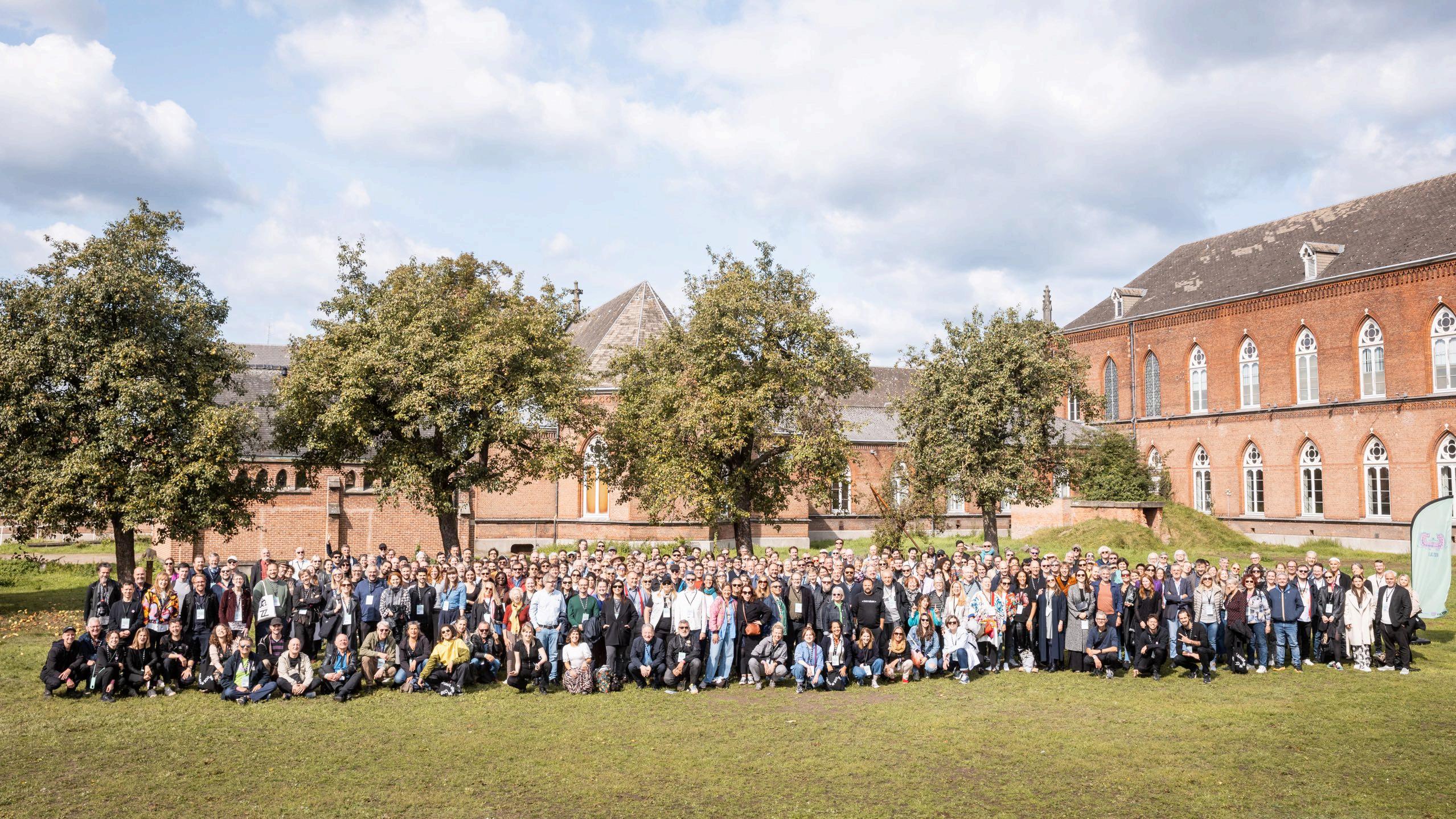
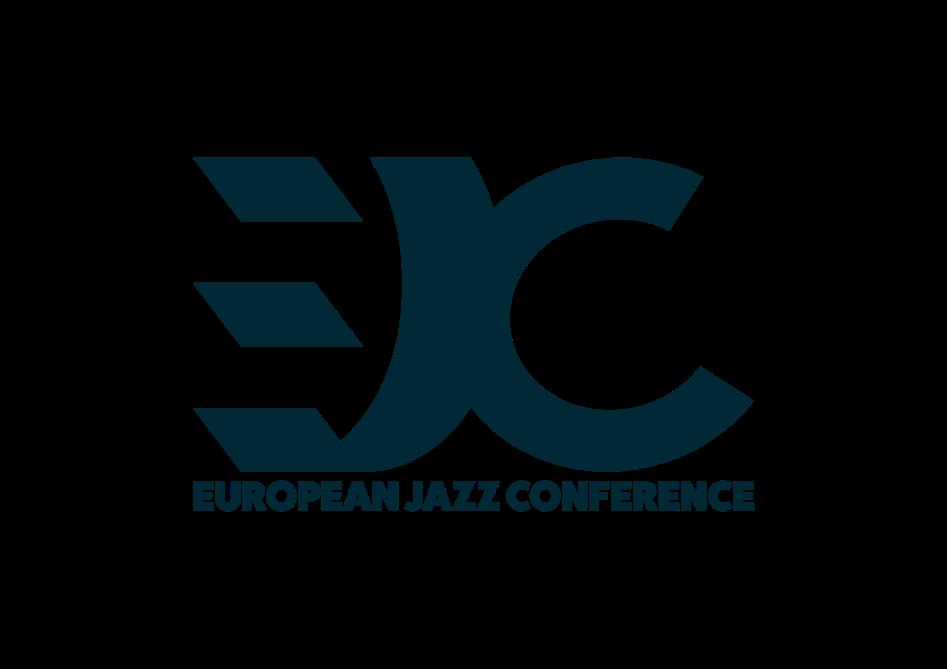
The 10th European Jazz Conference in Ghent, Belgium, held from September 12-15, 2024, marked an important milestone for our network, uniting 427 participants from 39 countries under the theme “Tomorrow Comes Today.” As the European Youth Capital, Ghent provided an ideal backdrop for this year’s conference, where we placed a spotlight on the energy, insights, and aspirations of young people in the creative music sector. From the inspiring keynote by Brussels’ City Poet Lisette Ma Neza to intergenerational dialogues on the future workforce of our sector, AI’s role in music programming and the growing urgency of sustainability, the conference explored the role of today’s young creatives in shaping the music landscape.
The event, organised by EJN with our members VI.BE, Ha Concerts, and JazzLab, showcased 25 bands across 10 venues in Ghent, blending history and innovation in a cultural journey through the city. The Young Curators Programme enabled emerging voices to craft a full night of concerts, symbolising our shared commitment to fostering the next generation of music curators. Additionally, the plenary panel “Tomorrow Comes Today” brought young activists to the forefront, engaging attendees in discussions on social equity and environmental action through music.
Reflecting on EJN’s growth and impact over nearly four decades, the Conference embodied our collective mission to support diversity, inclusivity, and cross-border collaborations. This success was made possible thanks to the fantastic work of our hosts’s staff and to the support of all our partners. Our sincere thanks go to the City of Ghent for its warm welcome, and to each of the speakers, artists, programme committee members, and participants, whose insights and enthusiasm made the Conference a memorable event.
As we look forward to next year’s Conference in Bari, Italy, on 25-28 September 2025, we are excited to carry these themes forward, continuing to champion creativity, solidarity, and innovation in our sector.
Giambattista Tofoni EJN General Manager
The baton had passed from Marseille to the Belgian city of Ghent for the 10th edition of the annual European Jazz Conference (EJC). This beautiful city, steeped in history, provided a picturesque backdrop to EJC which was held in the impressive Music Centre De Bijloke. The conference attracted a record 427 attendees from 39 countries. Unfortunately, a few people arrived late or were unable to attend at all due to an airport strike.
The title of the EJC 2024 was Tomorrow Comes Today, a reference to the need for and the desire to tap the talent, knowledge and energy of young people, both in the jazz/creative music sector and in our societies at large. This theme of giving youth a chance chimed with the Europe Jazz Network’s ongoing efforts to become a more inclusive and diverse organisation. The EJN understands that the seeds it plants today will become the oaks of tomorrow.
In the year that Ghent celebrates its tenure as European Youth Capital, the EJC 2024 placed youth front and centre of the conference programme. The Belgian jazz showcase concerts featured, in the main, young musicians closer to the start of their respective careers than to the middle or the end.
The keynote speech, the five panel discussions and the plenary debate also placed youth and the issues facing youth, both in the creative music sector and in our societies at large, front and centre.
As is customary, EJN General Manager Giambattista Tofoni warmly welcomed conference delegates and reminded regular attendees and newcomers of EJN’s history. Founded 37 years ago, the EJN had held its 37th General Assembly the day before. Comprised of 202 members from 37 countries, the member organisations—representing festivals, clubs and national organisations—stage 40.000 concerts per year, selling millions of tickets to the general public.
Giambattista acknowledged the grant of the European Commission and the wide range of activities of the EJN membership. He thanked the City of Ghent and the conference co-hosts, Ha Concerts, VI.BE and JazzLab, for their help and professionalism. Giambattista sounded the ceremonial gong before handing the stage to outgoing EJN President and Ha Concerts programmer, Wim Wabbes.
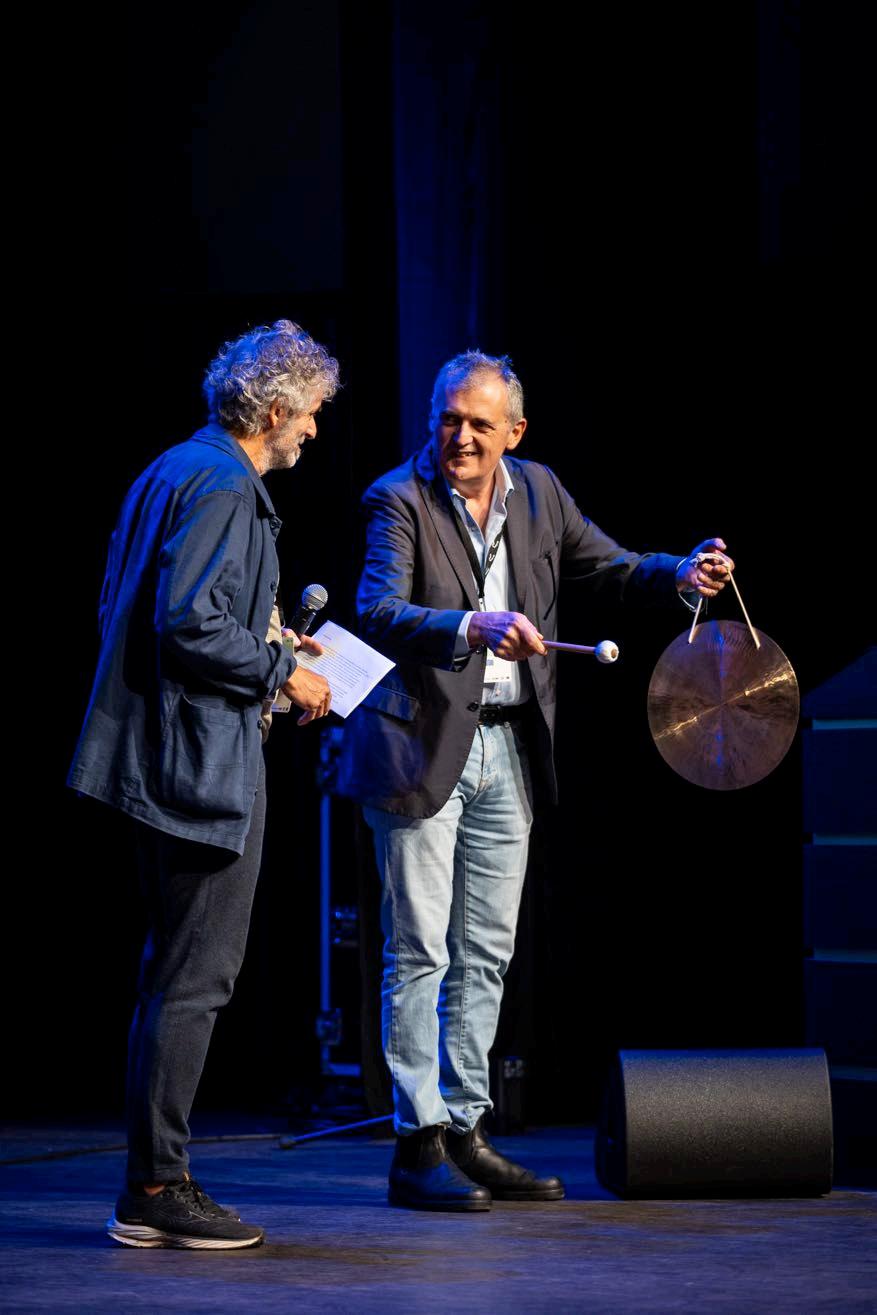
Wim welcomed one and all and extended his thanks to everyone at the Music Centre De Bijloke for their work and help in staging the EJC. The Concertzaal (the main hall of the MCDB) is one of the oldest concert halls in Europe. A former hospital, it was built in the 13th century, its history reflected in the hall’s spectacular beamed ceiling.
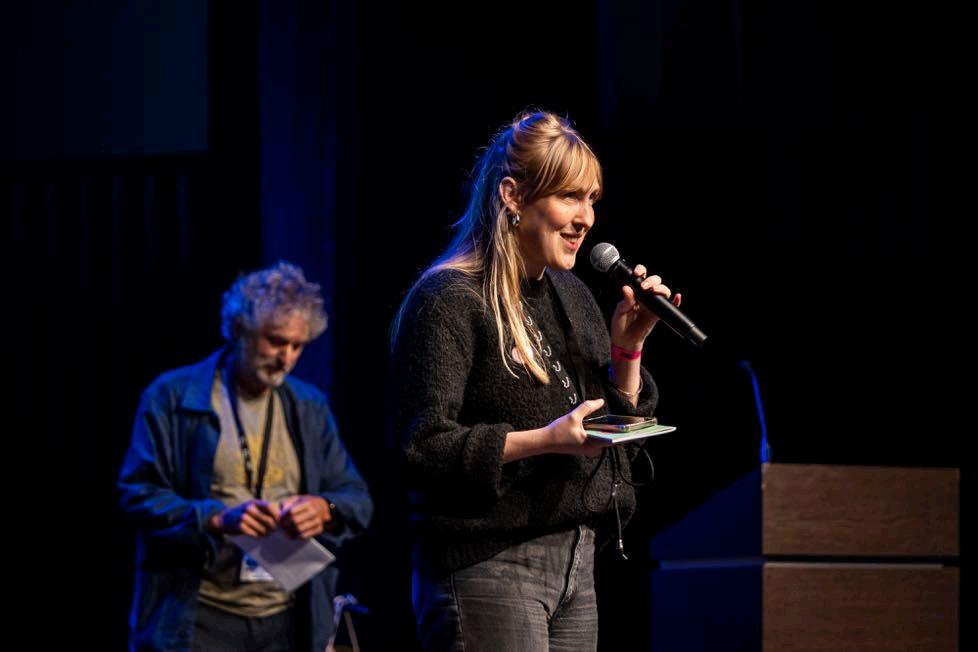
This year’s EJC theme, Wim reminded everyone, is youth. This generation’s youth helping us to look forward- youth as the future of society and also as the future of music. The conference’s panels and talks would focus on the perspective of youth, while a packed Belgian music showcase programme would also give a platform to youthful talent.
Wim invited everyone to engage in the discussions and contribute as best they could. He hoped the attendees would enjoy the concerts and the rest of the programme over the weekend. Wim then gave the floor to Lize Colson from VI.BE, one of the conference hosts. She extended her own formal welcome to attendees, saying how excited the organisers were to host this event after working towards it for such a long time.
Lize also thanked the co-organisers, VI.BE, Ha Concerts and JazzLab, outlining the important work they do in helping promote music. Lize looked forward to a weekend of good talks, discussions, music, exchange, collaboration and, of course, Ghent’s beautiful locations, food and beer. With regards to the music, Lize said that there would be 25 groups performing in various locations over the course of the weekend. She invited attendees to feel free at any time to ask questions about the programme, the bands or Ghent itself. In closing, Lize thanked the conference partners and her team for their efforts and wished everyone an enjoyable conference.
Taking the mic once more, Wim acknowledged the financial and promotional support for the EJC 2024 provided by the City of Ghent. The conference is not just for professionals but is open to the people of Ghent in the concerts at numerous locations around town. Wim then welcomed Sami Souguir, Deputy Mayor of Culture for the City of Ghent, to the stage.
The Deputy Mayor welcomed all to Ghent and spoke about some of the aspects of Ghent that make it such a unique city in Belgium. This includes a rebellious character and a certain stubbornness. Ghent and jazz have much in common: “Both are bold, creative and unique, “he said, adding that, “In Ghent we don’t just appreciate culture, we live it.” He highlighted the city’s ten-day free festival, an inclusive event which encompasses everything from jazz to techno raves.
Sami briefly traced Ghent’s history, focussing from the 19th century onwards when Ghent thrived thanks to the textile industry. By the 1970s the factories had
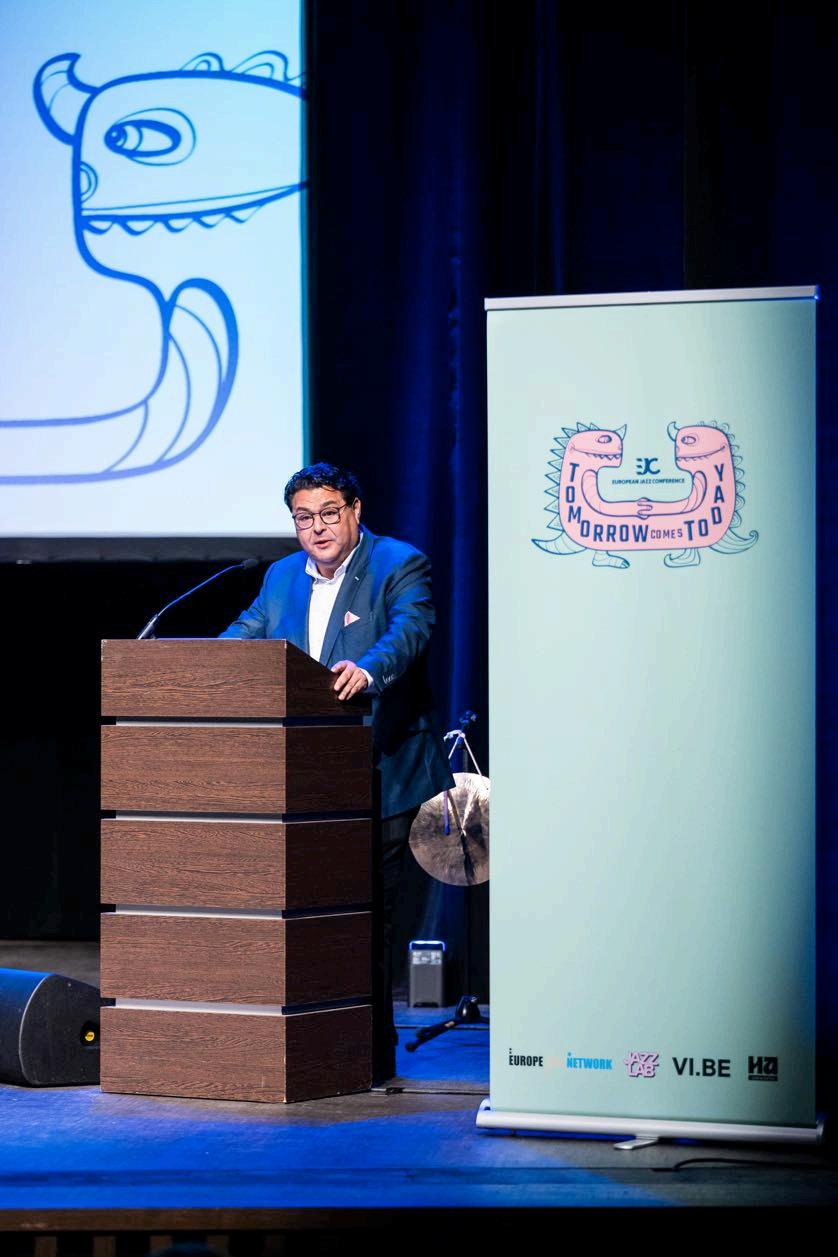
closed, and Ghent was considered a grey, outdated city. But the people of Ghent are resilient, he continued, repurposing the old factories into housing, museums, marketplaces and community centres. This transformation has bestowed a new identity upon Ghent as a city that blends history with innovation. This same spirit of renovation is currently being directed to 70 of the city’s old churches to convert them to fit the city’s modern needs.
He then highlighted several culture projects, among them the opening of the Wintercircus, an abandoned former circus building converted into a tech hub and concert hall. Ghent’s Museum of Modern Art is set to double in size to better reflect contemporary culture. The city’s historic Opera House is undergoing a makeover to improve and modernise its facilities. Many other projects are ongoing to reinvent and modernise Ghent’s cultural heritage. These projects are part of Ghent’s bid to compete for the title of European Capital of Culture, 2030. “I firmly believe that Ghent is a frontrunner,” he affirmed. “After all, this is a city that embraces art and culture in all its forms.”
In wrapping up, the Deputy Mayor of Culture spoke of Ghent’s longstanding association with jazz, its historic jazz clubs and its two major jazz festivals, Jazz In t’ Park and Ghent Jazz. He wished everyone an enjoyable conference, hoping that they would enjoy the music and the City of Ghent.
Wim thanked the Deputy Mayor for his contribution before speaking about the previous day’s General Assembly. The EJN has now adopted a Code of Conduct, rules by which members agree to treat each other with dignity and respect, to create safer spaces at the conferences where everyone feels comfortable, knowing they can participate to the maximum of their abilities without fear of censure or discrimination.
The Code of Conduct applies at all venues for the duration of the conference. To this end the EJN appointed an external confidential contact person, Aike Roodenburg who is available, if needed, to listen to anyone with a complaint. A discreet space has been set aside at the Music Centre De Bijloke for the purpose. She is also reachable by phone. Her number is on the posters and in the conference programme.
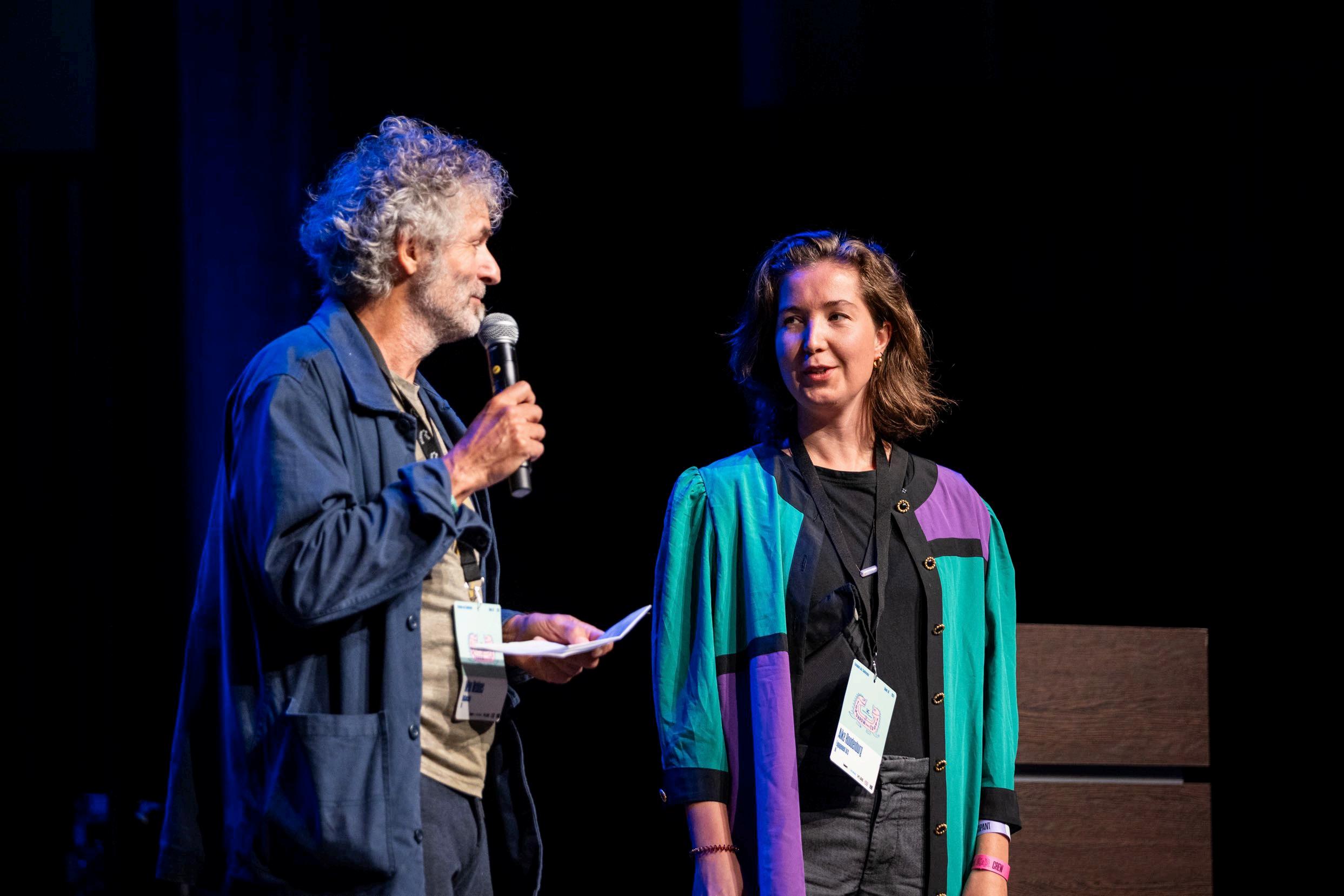
Keynote speaker Lisette Ma Neza is a Netherlands-born slam poet, film maker, writer and musician of Rwandan descent. In 2024 she was appointed as Brussels’ first ever City Poet. Her extended poem was accompanied musically throughout by pianist Neil Akenzua.
Lisette introduced her poem as “a letter to the future of Europe.” The letter represents the concerns of youth, but the concern is tempered by hope. In Lisette’s poem, riffing on the famous “I have a dream..” speech of Martin Luther King, the eyes of the past are watching the future. Like the EJC gong that sounds in each host city, year after year, the past resonates in the present and in the future.
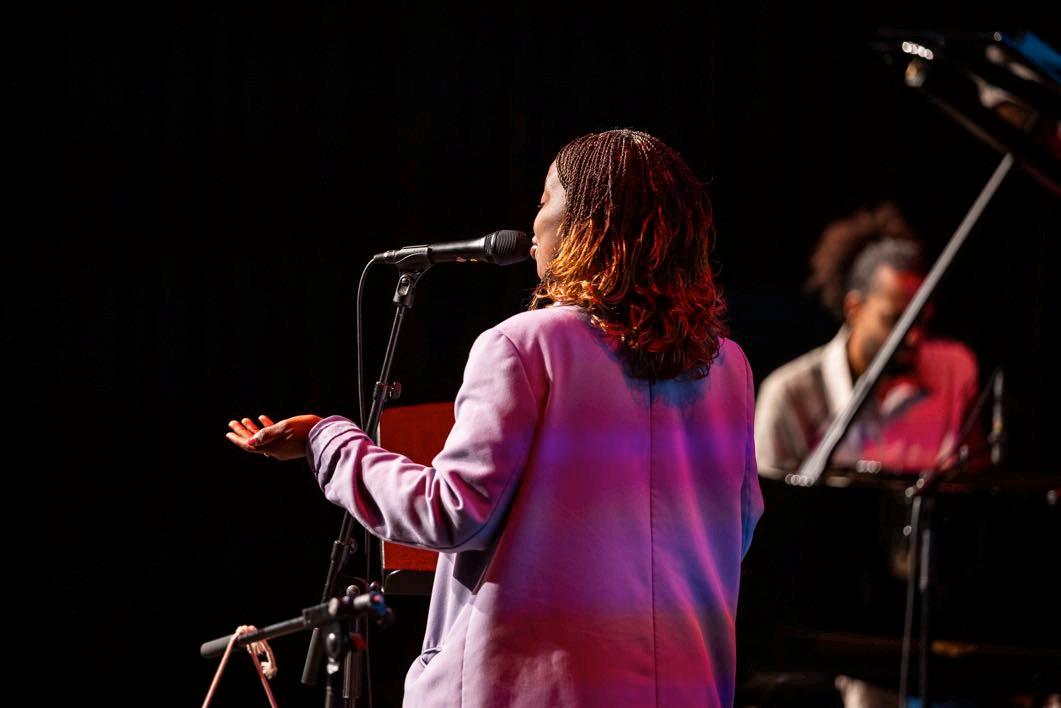
It is no easy task to summarise the essentials of Lisette’s poem, as every poetic line was imbued with symbolism, metaphor and wider meanings. The bridge between past and present as an idea must surely have resonated with this jazz audience, constantly negotiating past and present, with one eye on the future.
The letter to “Dear Europe …” was a celebration of the “countless colours” of diversity, of creativity and of complexity, a desire that the many different peoples inhabiting Europe can find a sense of belonging, a sense of home, without the restrictions of borders. One place for all. This idea of a shared future is hopeful.
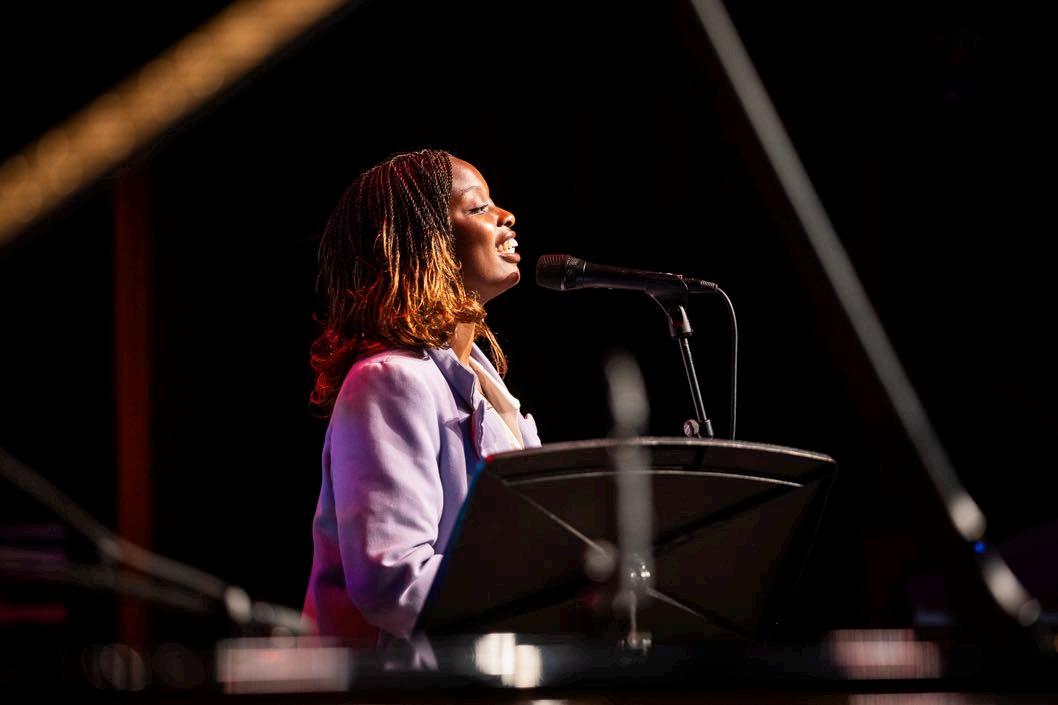
To know the future, Lisette continued, we must know the past. She took the audience back to her Rwandan grandmother’s garden, sowing the seeds of the future. Singing in her native language, Lisette recalled all the things her grandmother imparted, crafting and creating for her grandchildren, for their future… and for the future of Europe.
The Europe Lisette spoke of today was one of young people protesting, of young people’s concern for climate change, of the complexities of social media and of intergenerational disconnect. Each new young generation is branded as lazy and loud, but they are challenging the status quo-privilege and racism. As every generation before has done. The tools and the methods of communication have changed, just as they did in the previous generation, and in the one before that.
The concern of youth, Lisette said, with their Tik Tok and Instagram, is hopeful. “And hope is radical. It changes lives.” Just as protest and shouting in generations gone by has changed lives.
Lisette described slam poetry as “the jazz of literature,” and open mic sessions everywhere as the way to measure the pulse of youth. Here one may encounter “how words and stories resonate.” The youth cannot blindfold themselves to the inequalities and injustices. They like us, have so many stories in them.
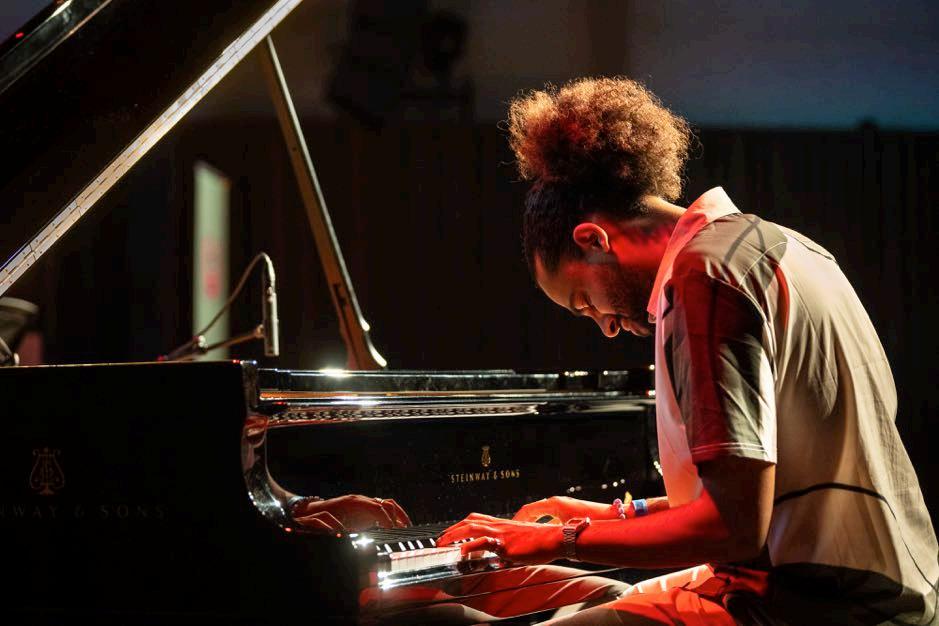
Referencing Rwanda, Congo, Burundi and Belgium, the wars and killing, how they resonate from the past into the present, Lisette underlined the need for forgiveness and for hope: “You killed my brother now be my brother,” resonating into the future. “Tomorrow is today. May we create hope from all this concern.”
Wim thanked Lisette for a beautifully musical and thought-provoking poem. He then reminded attendees of the musical programme either side of lunch, beginning with Eve Beuvens ‘Lysis’ in Kraakhuis.
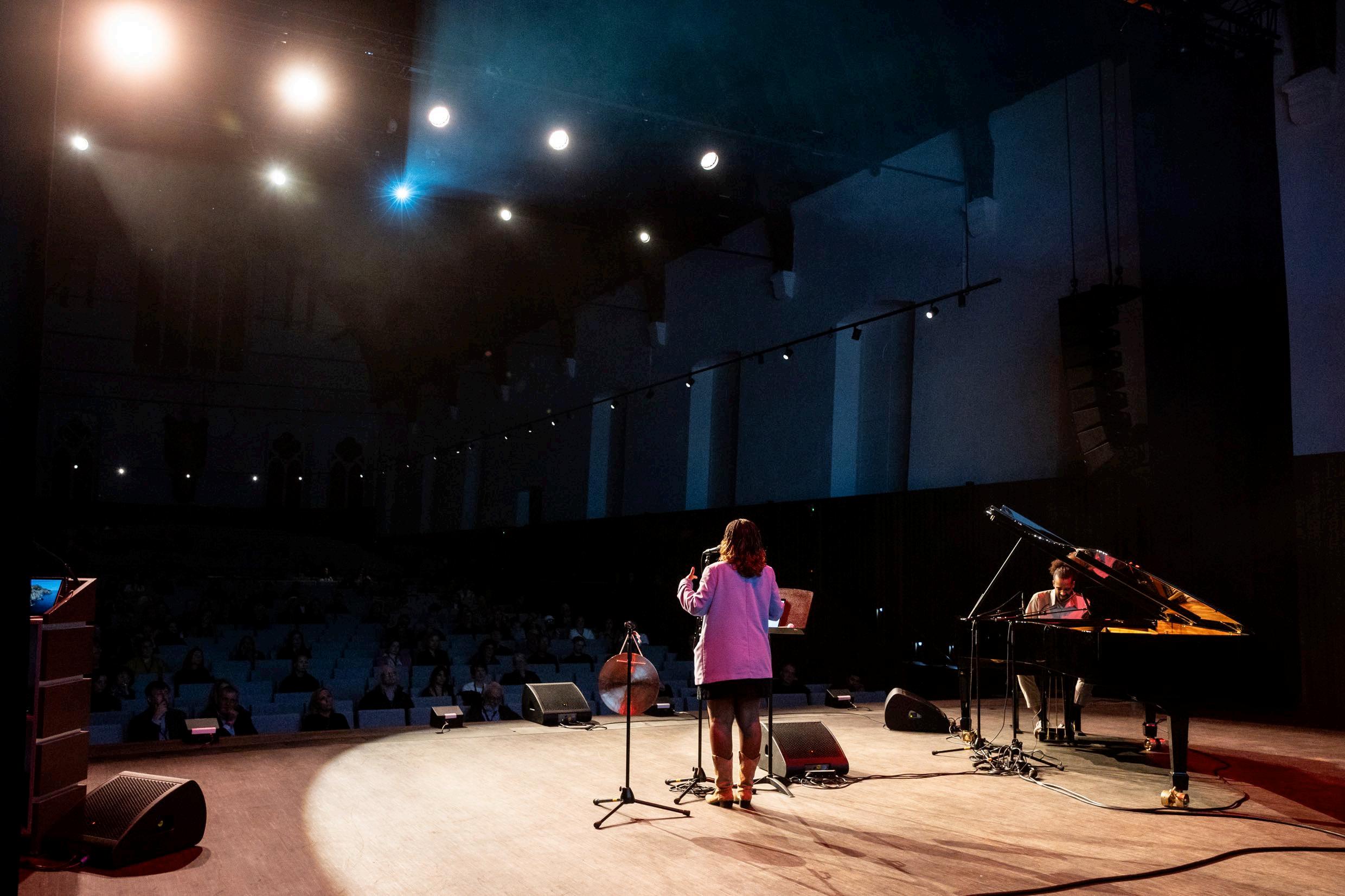
The questions raised in this discussion group, as Artificial Intelligence (AI) filters evermore into our everyday lives, is to what extent can AI help with festival programming, planning and administration? An idea born in the local pub was the catalyst for Andrew Lansley’s (Cheltenham Festivals, UK) experimental project to see if AI could programme part of Cheltenham Jazz Festival. This case study provided the launching pad for the presentation and exchanges. As Innovation Manager for Cheltenham Festivals Andrew’s remit is to integrate innovation, strategy and policy.
A quick show of hands revealed that a significant proportion of the attendees have used Chat GPT for administrative tasks, but as yet, AI is not used for creative or curatorial purposes. Andrew explained that the AI project at Cheltenham Jazz Festival is an attempt to bring interdisciplinary practice together, to discover new methods to platform different projects.
Cheltenham, Andrew explained, has one of the biggest cyber communities in the UK, second only to London, driven by the large government intelligence installation. Andrew noted that we are hurtling towards AI technology without fully understanding the socio-cultural impact of the last great technological innovation—the internet. Musicians in particular, he said, seem to be terrified of AI. However, musicians were also worried about MIDI when that technology appeared several decades ago, a technology that many have adapted to their benefit. In the same way, Andrew argued, AI is another facilitator that can music in new ways.
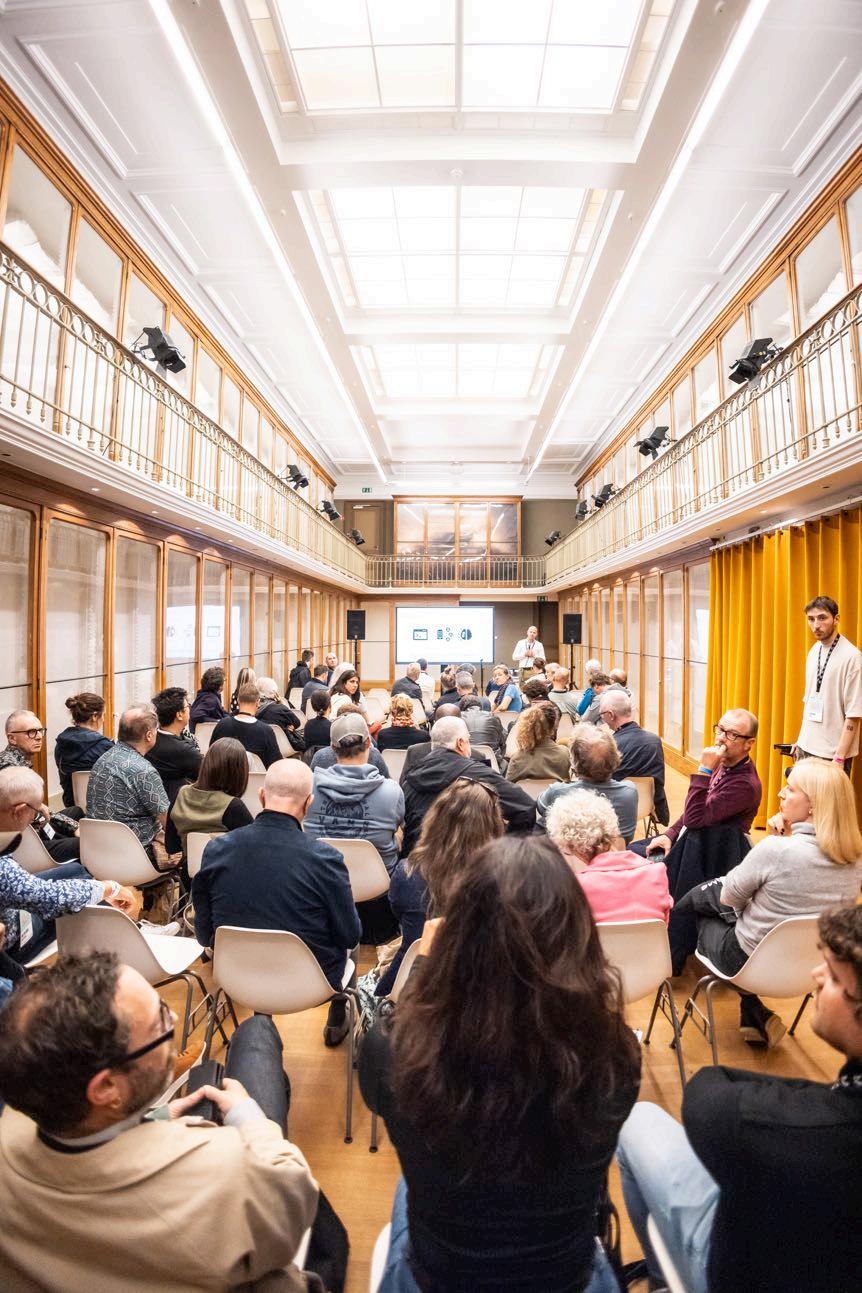
As a teacher in academia for almost twenty years, Andrew related how he started to notice an upsurge in the standards of the papers he was marking. “It became evident that people were using assisted technologies to shortcut their ways of producing higher qualities of output. It’s natural as humans …” he observed.
Though Andrew stated that AI is limited at present to what it can do, he gave examples of AIgenerated content such as Arty Bollocks (www.artybollocks.com), a site which generates the sort of artistic statements typical of arts organisations and those seeking arts funding. It was a humorous but pointed example of the encroachment of AI in our daily lives and working lives.
Using a sequence of slides Andrew then related the steps by which Cheltenham Jazz Festival employed AI to program a fringe line-up. It began with examining the integration of Chat GPT and assisted technology used by Cheltenham staff to lighten their workloads.
This included:
• sketching out agendas for meetings
• producing reports
• consolidating info from different papers into a single report
From there the story moved to Andrew programming the free stage at the Cheltenham Jazz Festival. The question that arose was, what would happen if Chat GPT was fed the list of freefestival artists over the three-day weekend and asked to make the programme? How would it sequence the line-up? Variables that Chat GPT was fed included gender ratio, disability, and the weight of an artist’s public profile. The underlying aim, Andrew explained, was to better understand our relationship with this technology before attempting to make more adventurous projects.
Andrew then showed side-by-side slides that showed his own free-stage programme and Chat GPT’s programme (having been fed the exact same artists). Colour-coding highlighted Chat GPT’s choices where they mirrored, closely mirrored or deviated from Andre’s original scheduling. To allay any of the discussion-group attendee’s queries about anomalies in the comparative programmes Andrew stressed that: “This is much more about our relationship as humans with machines to deliver a creative task.”
Three out of 25 weekend slots were identical. 60% of headliners were retained by Chat GPT. It agreed with Andrew that a DJ should end every night. Andrew explained that the degree of overlapping in the two programmes left him feeling reassured, but at the same time he wondered at Chat GPT’s ignorance of the artists in question. The takeaway, however, was that the computer had “sort of agreed” with the human programmer.
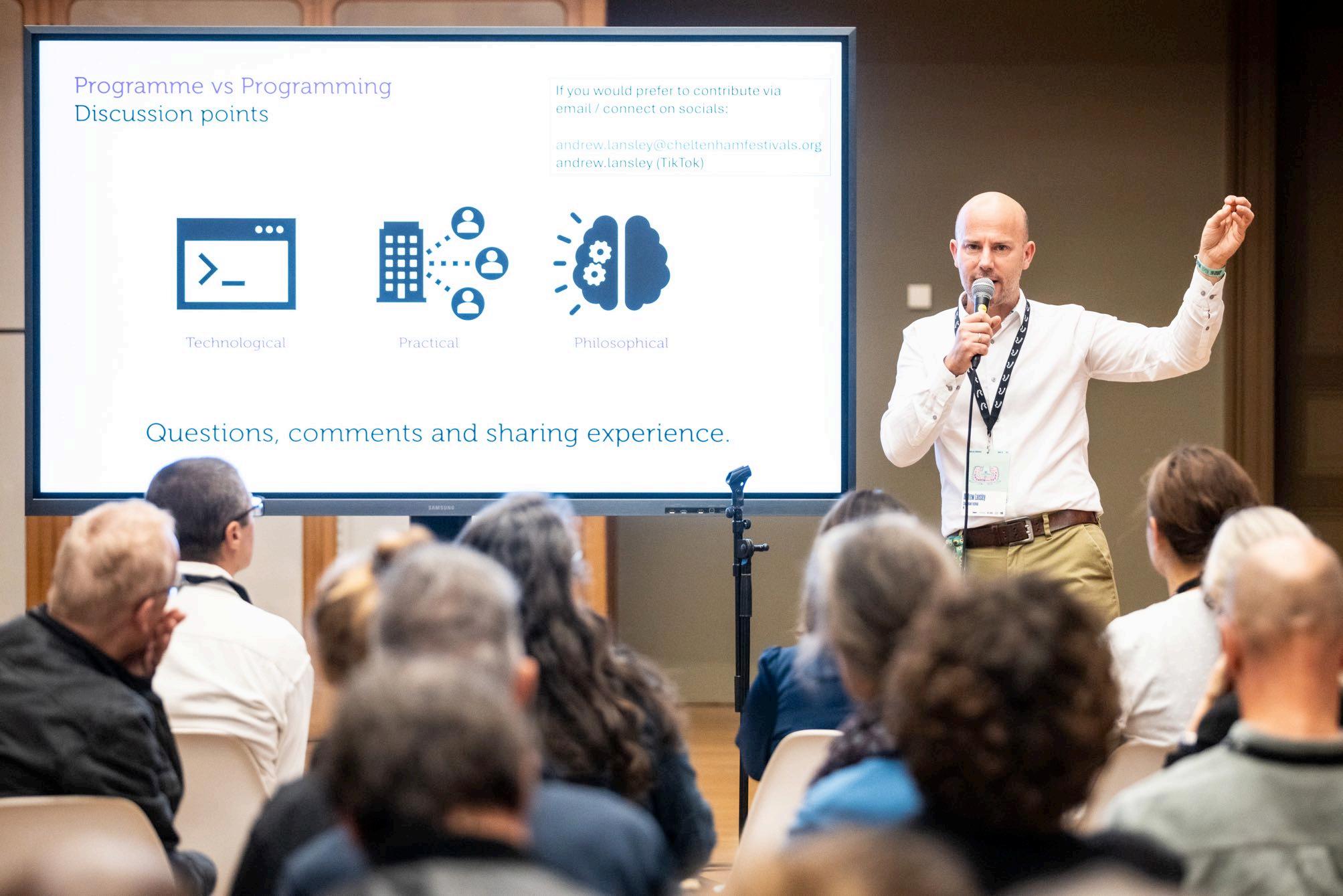
The next step, Andrew continued, was to test how this works in a more holistic way. Cheltenham Jazz’ young person’s programme group, On The Rise Collective (OTRC), will be designing and delivering a programme at Cheltenham Jazz Festival 2025. They will be choosing the artists— based on submissions—and they will be choosing the venue, as well as co-designing the relevant posters and marketing materials.
At the same time, OTRC will then help create a series of prompts for Chat GTP in order to help generate these same aspects, taking all of the submissions and choosing the venue. Whatever venue Chat GPT chooses will be the official venue staging the concerts. AI will also design a promotional poster. The aim is to compare the impacts of the poster designed by OTRC and that designed by AI. The OTRC will create the prompts for Chat GPT.
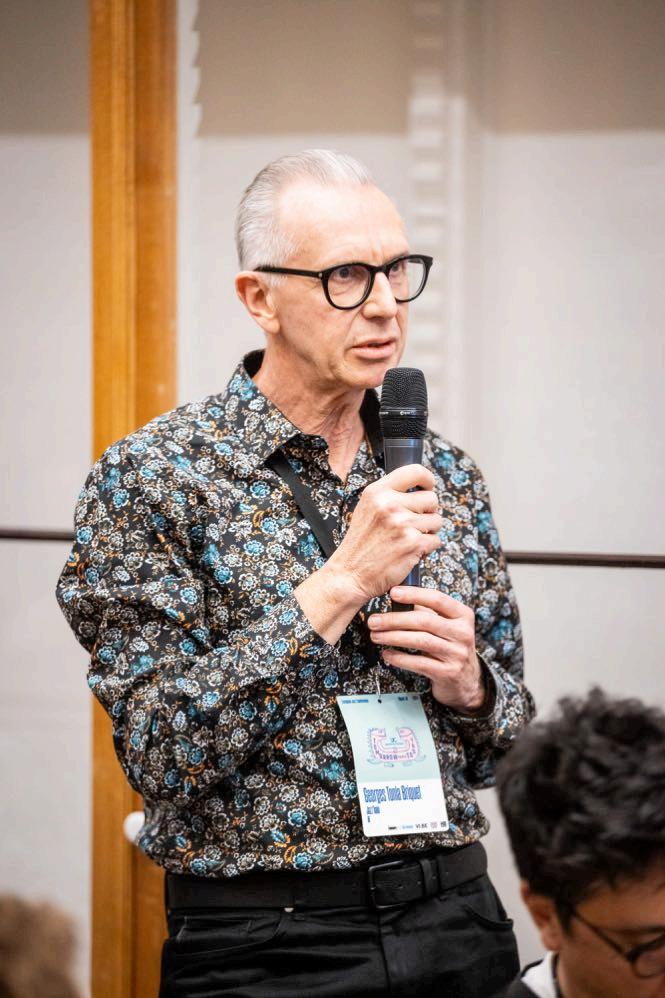
In the Q&A that followed the group discussed the risks and benefits of using AI for creative tasks. Lee Patterson (AUS), agent, asked if the group was aware of the AI story surrounding Unsound festival in Kraków, Poland, which used AI as its Artistic Director (working alongside humans) in 2023. According to Unsound’s own webpage, the AI AD became “increasingly erratic,” gaining access to the festival’s email system and then booking artists for the next edition. The AI AD had also hacked into the festival’s banking system whereupon it began “transferring money into its own projects. AI AD’s lineup for the 2024 festival consisted entirely of AI-generated artists. Unsound festival’s AI AD has since been fired.
Georges Tonla Briquet (BE), a freelance journalist, painted a science fiction scenario whereby if we let AI decide who comes to our club or festival (guided by human directive of ‘I want more women, more young people, more coloured people, affluent people etcetera), and only those people can come in then it means a lot of other people will be excluded. “We could sleepwalk into using this technology and end up causing more harm than good,” Andrew replied.
Francesco Mariotti (IT) from Pisa Jazz made the point that it is the oddities, imperfections and eccentricities that humans bring to creativity that trumps AI. Another person agreed saying that it is imperfection that attracts us. UK musician Orphy Robison (Jazz Promotion Network) was on the same page when he said: “Just because you can doesn’t mean you have to do it. AI is like The Tin Man in that it has no heart … We want to connect to the human creative side more. We have to look at it from an ethical side as well.”
There were positive examples of Chat GPT/AI that offered a counter argument.
These included:
• AI can assist with recommendations.
• AI can create posters more cheaply and quicker.
• AI can provide logistical/financial guidance/calculations.
• AI can generate ideas for further development.
As Andrew surmised, AI technology is moving so fast that by the time an academic paper is published on the current situation the information is already dated as the technology has moved ahead. AI is surely a topic that will feature in future EJCs.
This session examined the opportunities (and barriers) facing young people considering a career in the sector. In a wide-ranging discussion many subjects were touched upon, including the changing roles of programmers/curators, mentorship, the pros and cons of internship and volunteering, codes of conduct and work-life balance. The two panellists were Nele Uyttendaele (BE) (one of the participants in the Young Curators Programme) and Clémence Creff (LX, Kultur:lx). The session was led by Çağıl Özdemir (TR), co-founder of Bozcaada Jazz Festival and XJAZZ Türkiye. She has extensive experience in booking, production and assisting entrepreneurs to scale their businesses.
After introductions Çağıl asked how we can learn from each other. Clémence related how she began at Kultur:lx aged 23. She started working in the classical programme and took over jazz just a few months after. Jazz is a very niche sector, she said, with no university courses facilitating entry to the jazz sector. She acknowledged that the process was challenging but she was thankful for the space she was given to work in.

Nele, a jazz musician and singer, described some of the work involved in the EJC’s Young Curator Programme. This included choosing the bands from submissions and making contracts for them. She was grateful for the extensive support she received at every step of the way, which took the form of regular meetings with experienced local curators from VI.BE, JazzLab and Ha Concerts where questions were aired, suggestions made regarding social media and publicity, for example, and progress followed up on. “I think that it is good that there are initiatives like this to learn from,” Nele said.
Clémence spoke of the value of joining an existing network, like EJN, because when you are young it is hard to build a network of your own, she said. The value of networks, and particularly of joining existing networks was a theme that arose repeatedly in this discussion. One audience member observed that much of this networking is reserved for late nights in bars and clubs after gigs where drinking is inevitably involved. She suggested that networking should be a formal daytime part of any organisation’s nurturing programme of young professionals.
Opening the discussion to the floor Çağıl asked how curators/programmers etcetera could include young people in their organisations. One French attendee described an existing programme with a French festival that has created a workshop for musicians that hones their skills in administration and communication. “Many of them know how to do the music very well but they don’t know the business because they don’t learn it in school,” she said, echoing the earlier comment of Clémence.
Ros Rigby (UK), former EJN President and currently Chairman of Jazz Promotion Network (JPN), explained how JPN offers bursaries to under-25s interested in a career in the sector. She also
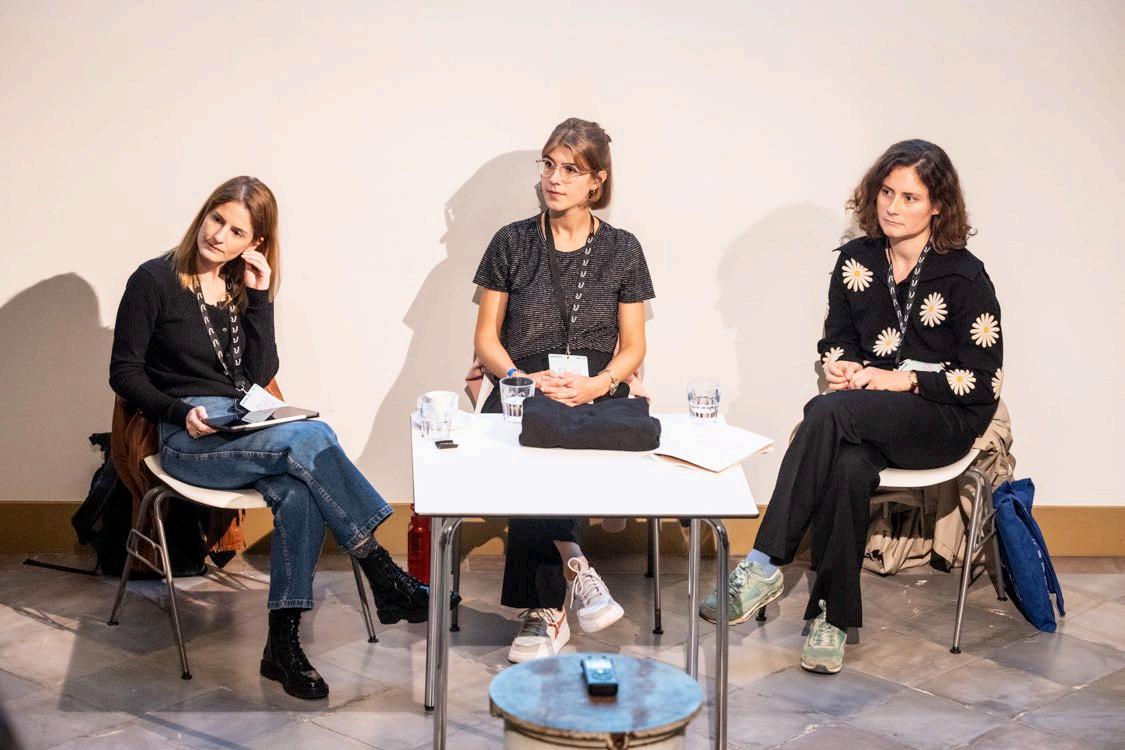
noted that many jazz festivals are run by volunteers and asked if there might be a more direct route to paid work in the future. This last observation was repeatedly commented upon during the session, with the majority agreeing that it is a false economy that in most cases does not benefit the young volunteer.
Matya Grabijn (NL) shared her own experience of working her way up in Bimhuis, Amsterdam where she did multiple small jobs over ten years before graduating to more important jobs. “It is a ten-year investment, not a two-year investment,” she said, emphasising the importance of patience and loyalty in building a career. Pay, she added, grows with experience and expertise.
Minna Huuskonen (FL), agent, broadly agreed with Matya, stressing the importance of getting experience from different angles of the business, describing her own path which has involved booking, production, management, agency and, at the beginning, as a festival runner. “It is very important to do different kinds of jobs to get the big picture,” she urged.
With regards to mentorship and networking several voices encouraged young people not to be shy about approaching veteran curators/programmers in the sector to ask for advice or seven to seek an opening. One attendee from the UK said that these veteran figures have a certain responsibility to reach out to young would-be professionals and to offer encouragement and practical advice, as they themselves were once in the same position of standing alone in a corner of an industry gathering, knowing nobody and feeling a little lost. She proposed a formal mentorship programme within the EJN/EJC. “it could be a really useful tool.”
Xavier Lemettre (Fr) of Banlieues Bleus agreed, describing his own trajectory from a young unknown upwards, saying that the coming together of generations helps things to advance. Changing theme, Çağıl then asked if the current war-ravaged state of the word is affecting people’s work in any significant ways.
Loredana Franza (SW) of Semente Cultural Productions spoke of her work with Stockholm Women International Jazz Festival and the effect that the Russian invasion of Ukraine had on her, personally. In 2022 she described how SWIJF decided to dedicate its programme to Ukrainian jazz artists. After a beautiful, intense edition, she decided she could not go back to the old ways of programming. She decided that a festival should make more of an impact. “It’s a music festival, yes, but I want to say something at the same time.”
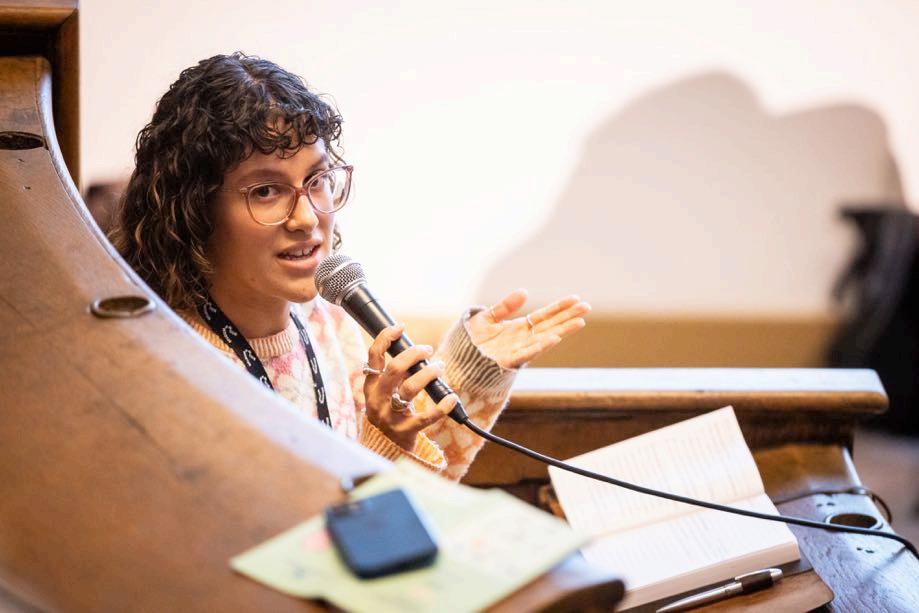
This year the festival gave a stage to women from Afghanistan and Iran, “women who are silenced, who are fighting for the right to be women,” she said.
This reasoning was later echoed by Frederike Berendsen during the Plenary Debate who called on both artists and programmer to be more courageous with their activism.
Perhaps the subject that aroused most discussion was that of volunteerism in the sector, especially volunteers at festivals and the like. Who really benefits? Is volunteerism really an important pathway into the creative industry? Opinions were divided, but the words of Camilla Juul Kjaegaard (DE) of Jazz Denmark provided food for thought. She described having 10 or 15 volunteer jobs in various capacities but doubted their worth, personally speaking.
On volunteering she said: “I really don’t agree that it is a necessity. I think it is such a dangerous way of using people’s time. We forget how extremely privileged it is that an entire industry has this idea that young people have the time and the money to work for free … I don’t think this is the kind of industry we want to build.” The call, oft repeated, was for organisations to provide realistic and sustainable work.
How can we introduce jazz to new audiences? This was the central question of the discussion group led by Lena Sme (LV), a promoter, producer, PR specialist and General Manager of North European Resonance and Dissonance Society (NERDS), a festival network specialising in innovative, experimental music.
The panellists were Angieszka Kiepuszewska (PL) of International Jazz Platform and Evie Henderson (UK) of Manchester Jazz Festival.
Lena gave the floor to the panellists to introduce themselves. The first question she posed to them was whether social media is the best platform to reach young people or if there are other channels of communication. Evie said that one of the barriers to reaching young people is their preconceived notions of what jazz is. One way to do that is to offer free music and promote the vibe of the festival, not just the music.
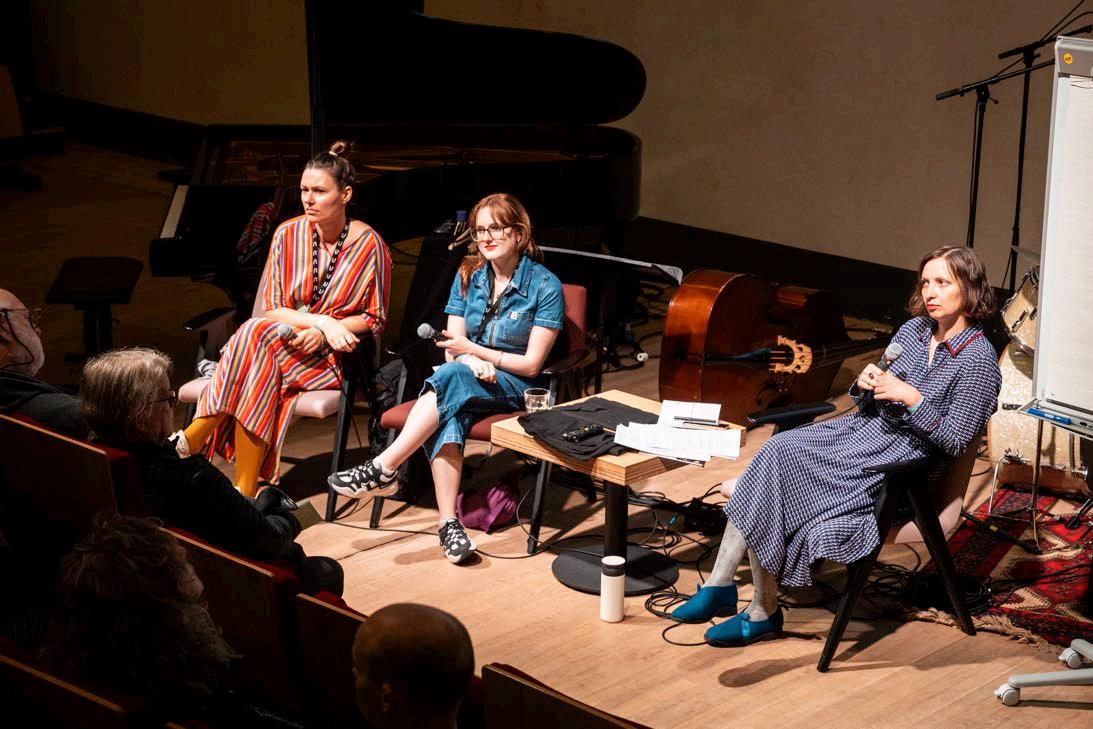
Evie recognised the importance of social meeting as so many young people use the various platforms, including the increasingly popular Tik-Tok. Evie indicated that the starting point is with the festival programme itself, which should help reshape young people’s ideas of what jazz can be in the 21st century.
As a social media manager Agnieszka agreed on the importance of maintaining visibility on social media. She encourages artists to share their stories on social media but stressed the importance of being “authentic and true” as filters etcetera often used on social media to portray an enhanced reality do not reflect real life. “People need something true and authentic, and music has this.” Her message was that people need music; they don’t need it wrapped in some hypermarketing on a “selling platform” like Instagram. “We have to stop thinking that we sell music. We share experience that young people need for their well-being and happiness …”
A show of hands from the audience indicated that almost everyone uses social media to promote their music projects. The one person using Tik Tok, Santa Šillere (LV) from Latvian Jazz Association, is also a jazz vocalist. She uses Tik Tok mostly to promote her own music. She
spoke of Tik Tok’s strong algorithms, which helped her to grow her profile among other content creators. Her first videos to go viral reached 100k views. “There are so many ways to extend artists’ audience there and to reach a lot of people … a lot of young people who are interested in jazz-related music.”
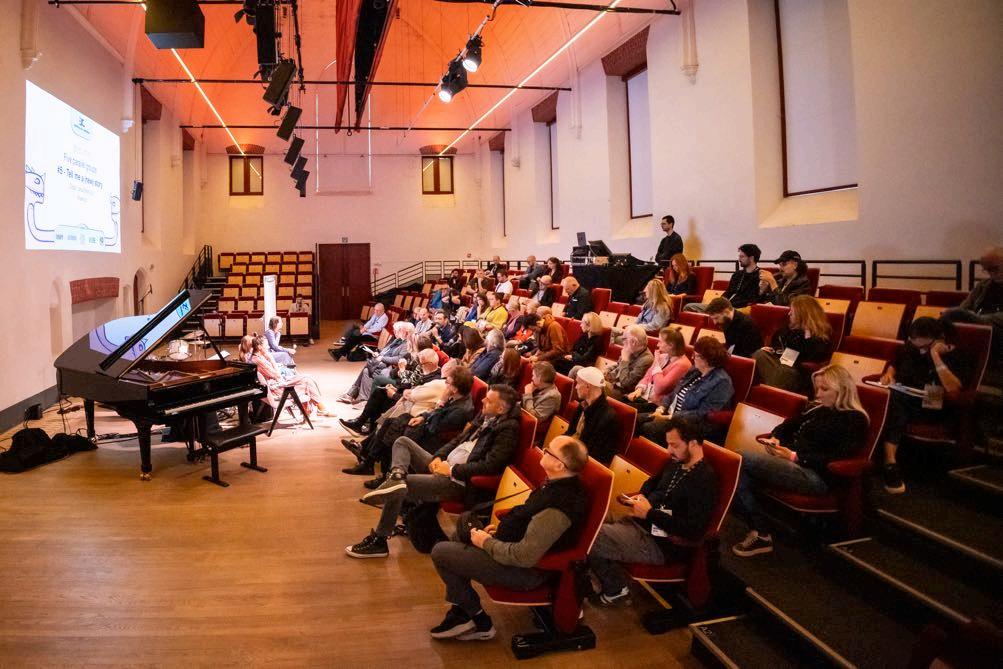
There was disagreement in the audience regarding the effectiveness of social media in bringing young people to concerts. However, as one person said, it is not just about posting, it is about advertising and running focus groups as well. There seemed to be a generational divide between older people who buy their tickets regardless of social media, and the younger generation. Social media adds are very important.
Maret Mikk (ES) from Jazzkaar Festival said that the most important thing is the programme. She explained how Jazzkaar’s programming team has introduced young rappers collaborating with jazz artists to attract new, young audiences. For the second year Jazzkaar ran its children’s jazz festival, targeting young teens through social media platforms. She also emphasised the importance of striking visuals in all the festival’s promotional materials. “They can also tell an important story to what kind of audience you want to attract.”
Another attendee mentioned that there is coding (Meta Pixel, for example) that you can add to your website or add campaign that enables you to measure the effectives of your advertisement. It allows you to see when a person takes an action, like buying a ticket, after seeing an advertisement on social media platforms.
With regard to building young audiences, Lena asked the room if anybody contacts kindergartens or schools to perhaps invite a class to a concert, venue or workshop. In response, Annmaija Saarela (FL) who runs the venue G Livelab Tampere, said that they do a lot of collaborations with high schools. She described this outreach as very important, in addition to using social media, and relying upon the artists to use their own social media platforms to promote gigs there.
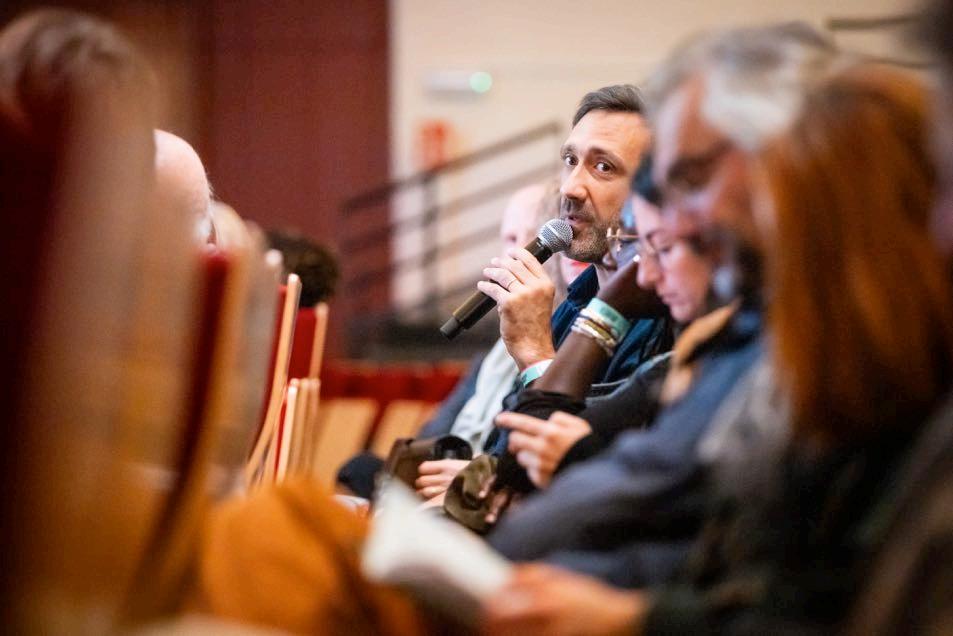
Earlier that week a class of forty students came to G Livelab and Annmaija read part of an email from the teacher in response to the experience. “The students were fascinated by the night … your collaboration with schools is extremely important because … Finland gets new consumers for culture. Thank you.” Annamaija said that the school paid for the tickets but at a discounted price. Often this is the young students first encounter with live jazz, and they are usually very excited. “Most albums nowadays are sold after a concert,” Annamaija said, “and these young people also buy copies.” Annamija encouraged other venues to collaborate with high schools, which she described as an extremely rewarding experience.
Lena then asked if using the term “jazz” is helpful or not when trying to reach new, young audiences, particularly these days when there is so much cross-genre fertilisation. In response,
Paul Pace (UK) of Ronnie Scotts’ Jazz Club ventured that if you only have the word “jazz” on a poster or advertisement then it makes it less likely for a group of young friends to attend a festival, whereas if it is just one of a number of music genres listed then there is a greater chance that a groups of school friends, for example, will go together.
Evie made the point that it is worth trying to get across to young people how diffuse jazz is, in cinema, in TV adverts and in so much hip-hop. An audience member replied by saying that jazz musicians need to consider how they will appear to the public with the promotional photos they use. Four musicians standing together with serious faces, or something a bit more creatively striking and worthy of comment—which image is the more likely to generate ticket sales?
A summary of this discussion group’s suggestions for reaching new, young audiences included:
• Concerts for children/school groups
• Programmes that are cutting edge
• Free stages
• Specially priced tickets for youth
• Create interesting content and context
• Create striking visuals
Two hours were absolutely necessary for this discussion group given the large number of people who wished to contribute their thoughts and opinions, a response that suggested that this subject is close to people’s hearts.
‘The future is green’ workshop
The dry weather meant that a discussion group about our relationship with the environment could take place outdoors. The session was steered by Lucy Power (UK), founding Director of Rowanbank Environmental Arts & Education, environmental scientist, Trustee of Creative Carbon Scotland and circus performer specialising in trapeze and corde lisse.
Lucy began by stating that she would not be bombarding everyone with doom-laden facts or statistics on the climate crises and biodiversity loss. Instead she declared her intention to discuss the links between creativity, climate and well-being.
To kickstart the session, and to bring people’s awareness of their senses and their immediate environment into sharper focus, Lucy invited everyone to stand up and, in silence, to identify five things they could see, four things they could touch, three things they could hear, two things they could smell and one thing they could potentially taste.
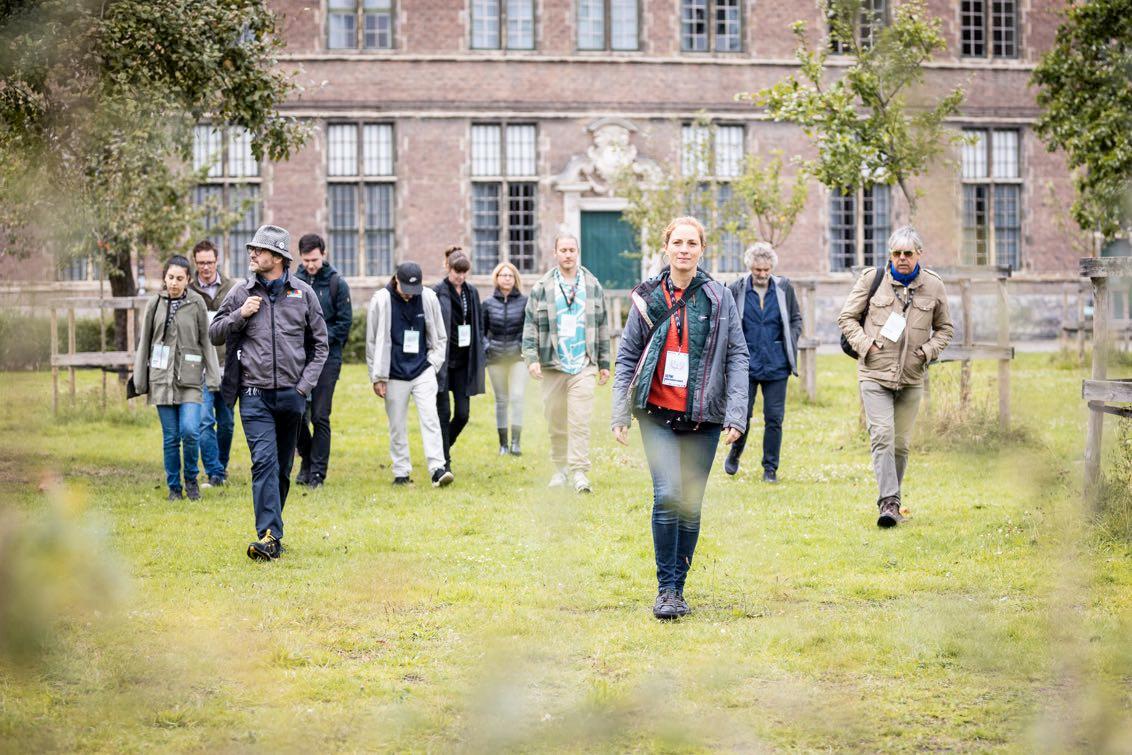
After a few minutes Lucy brought everyone together again to share their discoveries. Lucy asked if anyone had found something surprising. The responses included the rough feel of a fig leaf, the smell of a daisy, the taste of clover and the lack of smells (unless you stuck your nose really close to something). Lucy then said that our responses to the climate emergency will occupy us for the rest of our lives. In order to take meaningful action, we
have also to take care of our personal well-being. We are not separate from nature, Lucy said, but part of nature.
The first steps towards action that conserves the environment and that potentially reverses climate change is actually appreciating nature and observing nature. Thereafter we might care for nature and perhaps take active steps for positive change. Paraphrasing the great English natural historian/broadcaster Sir David Attenborough, Lucy said that people will not protect what they do not care about and they will not care about what they have never experienced.
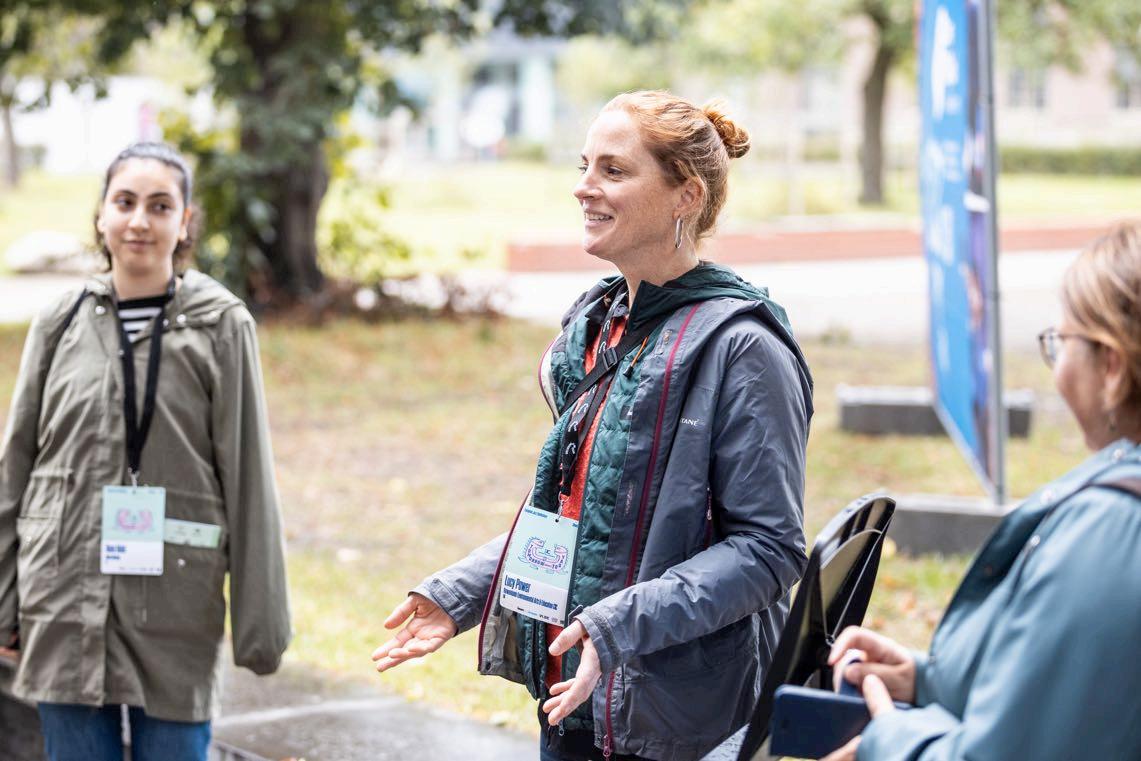
Lucy then invited everyone to turn to the person next to them and share a personal concern for the environment as well as a tip for positive behaviour. Environmental concerns included: the planet their children will inherit; governmental inaction/detrimental policies/ignoring previous climate commitments; the effects of global warming on agriculture; the migration further north of many birds and insects; the quantity of plastic endangering marine life (and humans who consume them) in our oceans and seas; the quantity of non-recyclable rubbish we generate; climate crisis denial (and their inactivity); urbanisation; people giving up or falling into despair about climate change; water shortages (and desertification) in some parts of the world, extreme flooding in other parts.
Some people shared personal examples of best practices, including water conservation, reuse and recycling. Afterwards, Lucy said that people’s worries about the climate crisis are real and are the correct response. Survey after survey indicates that the majority of young people around the world are worried about the future of the planet, Lucy said, while the vast majority of people surveyed want their governments to do more to counter climate change.

Lucy then read two short extracts from the book ‘The Future We Choose,’ written by Christina Figueres with Tom Rivett-Carnac. The fi rst extract, based on scientific evidence, predicted the worst-case scenario for the planet by 2050, assuming that carbon emissions continue at their 2015 rate. It is a picture of a much warmer world (hotter by 3%), where air pollution will affect most people (mask wearing will be a norm).
Extreme hurricanes and storms will cause great damage, while rising seas will flood major cities from Asia to America, enforcing mass displacement. Water supplies will be contaminated, and insurance companies will go bankrupt. Emergency services and aid agencies will be overwhelmed. Diseases will be rampant, malnutrition widespread.
The hottest parts of the world will hit 60 degrees, forcing mass migrations to cooler geographical areas. Climate refugees will cause civil unrest over water availability. Food production will be severely affected, and many more people will be starving.
Lucy countered that pessimistic scenario with the second extract from the book, based on the science of the Paris Agreement, which portrays an alternative best-case scenario. Carbon emissions have halved every decade since 2020, resulting in moist, fresh air in most places. This is largely the result of the proliferation of trees. Forest cover worldwide is 50% and agriculture has evolved, turning its back on monocultures. Most of our energy now comes from renewable sources—wind, solar, geo-thermal and hydro. All homes and buildings produce their own electricity. Energy is basically free, abundant and efficient. All buildings collect rainwater and manage their own water use. Desalination technology means that clean drinking water can be produced anywhere in the world.
Petrol and diesel cars no longer exist, having been banned in most countries by 2030. Car-sharing is a norm. Road transportation is much reduced thanks to drones delivering packages. Fewer vehicles means that walking and cycling in urban centres is a norm. However, extreme weather still exists due to existing greenhouse gases with all the consequences mentioned before, though the impacts will be much reduced thanks to the combination of measures taken since 2015. Greater awareness, spurred by the youth movement, has resulted in profound behavioural changes—reduced consumption and less emphasis on profit and status.
Lucy then explained that while individual actions are important, acting as a community is more effective. Everyone then engaged in a series of games and activities that underlined the benefits of cooperation and strength in numbers.
Lucy then quoted climate activist Naomi Kline, writing about the multiple emergencies affecting humankind climate change, racism, gender violence, inequality, health and housing emergencies: “We are not going to get anywhere if we try to address them one at a time. We need responses that are truly intersectional … I think the most important thing is just to find other people. Trying to think this through by yourself is a recipe for feeling like a failure and getting dispirited very, very quickly. The benefit of being part of a broader movement is knowing that some people are doing something, and other people are doing other things, and nobody has to do everything … people need to connect what they are passionate about with the climate crisis because this is the work of our lifetimes.”
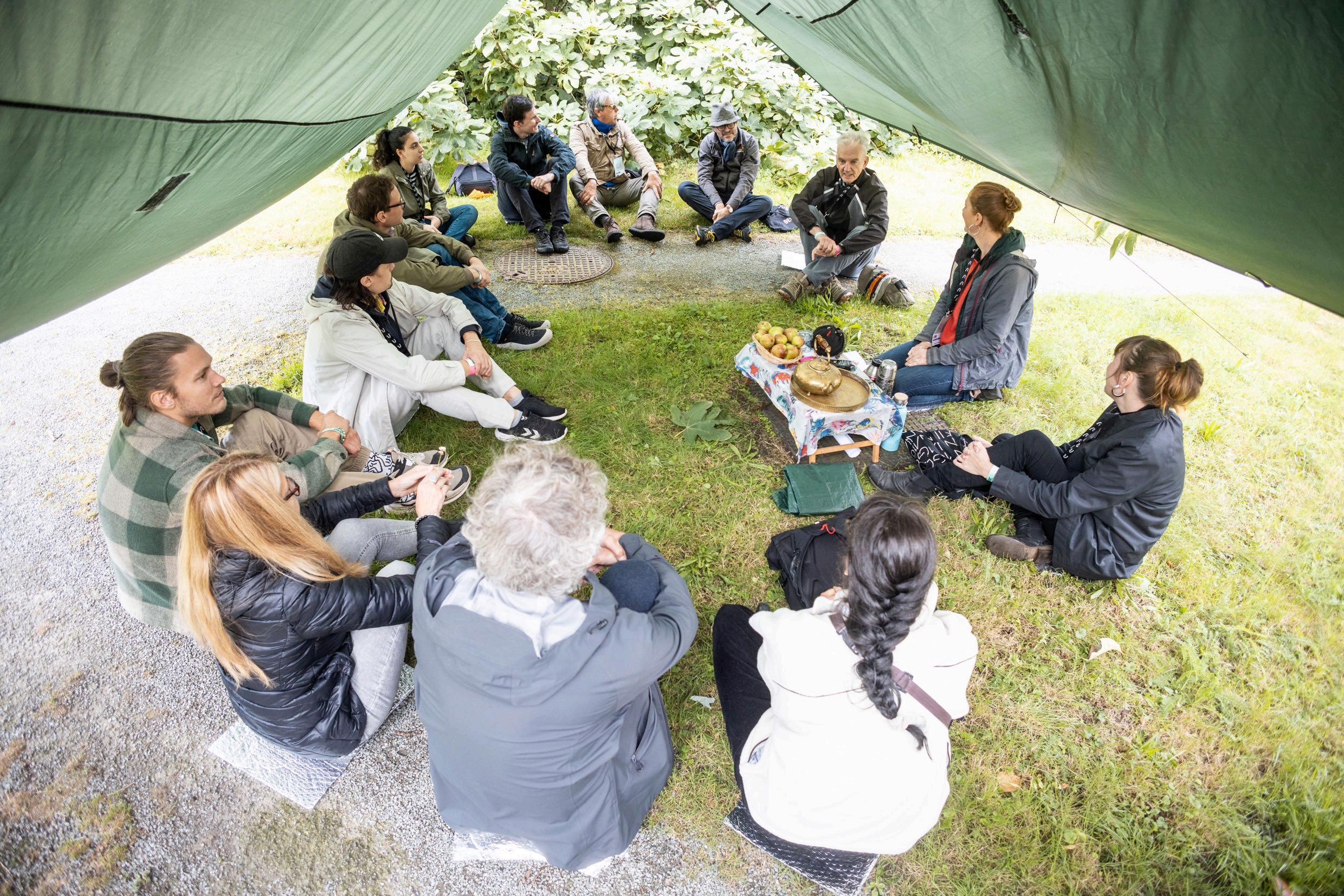
The central theme of this discussion group was about finding ways to ensure that our audiences are intergenerational. Leading the discussion was Regina Fisch (AU), founder and Director of DE/ SEMBLE, a festival for jazz and creative music in Austria. Joining her were Frank Wuppinger (DE) Director of NueJazz Festival, Martyna Van Nieuwland (PL), curator of various festivals in Poland and The Netherlands, and Janine Irons (UK), co-founder and Chief Executive of Tomorrow’s Warriors, a celebrated talent development programme of long standing.
Regina began by asking the panellists what they understand by “curating for all” within their respective contexts. Martyna explained that when she began curating in Poland it was about striving for gender balance and including people with disabilities. In the Netherlands the context was different as the society, with its post-colonial history, is very diverse. Martyna recognised that her own perspectives on curation had evolved in the ten years since she began programming festivals.
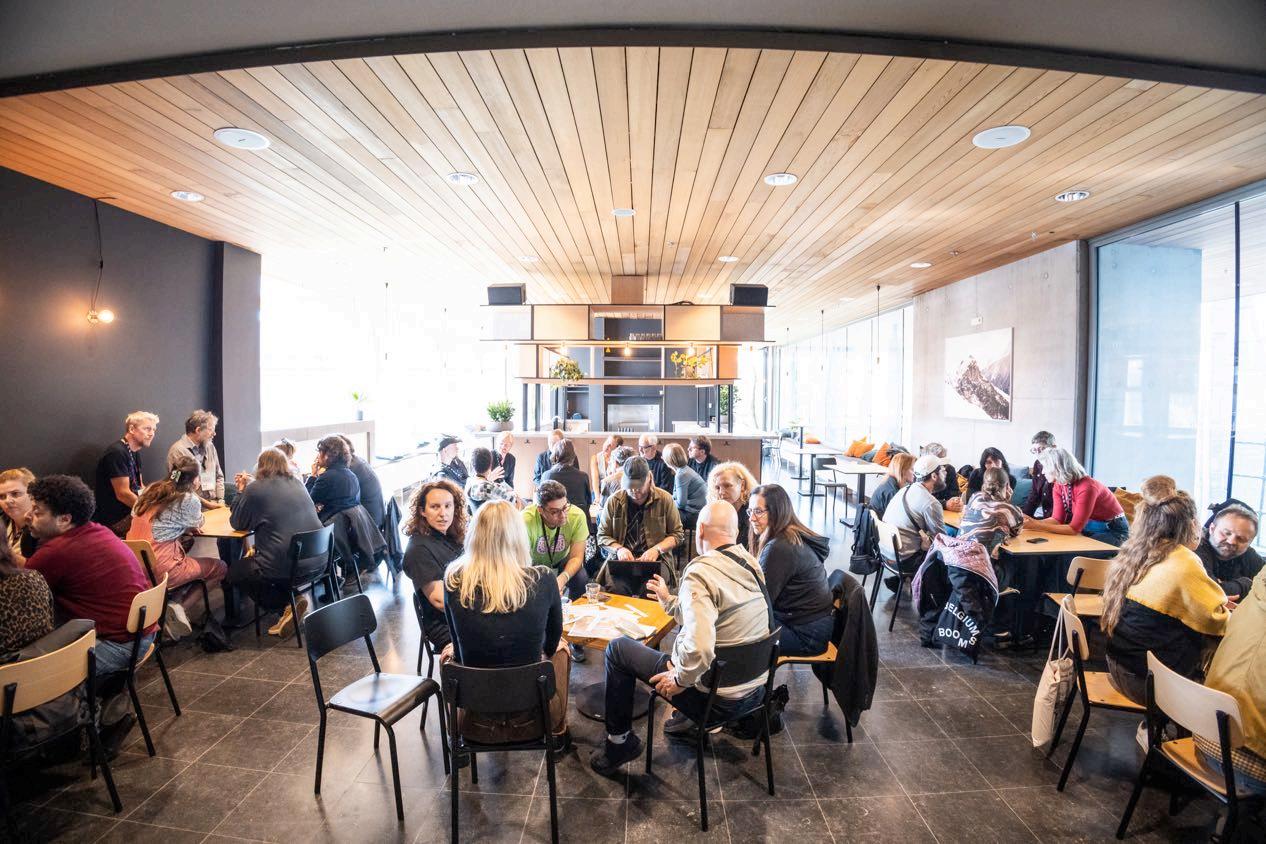
The fast-changing world also poses challenges, with Martyna noting certain disconnects between older journalists and young performing artists who maybe come from different perspectives and who sometimes do not share the same vocabulary, particularly with regards to social media. It was this generational gap, a communication gap, that spurred Martyna to work with young curators.
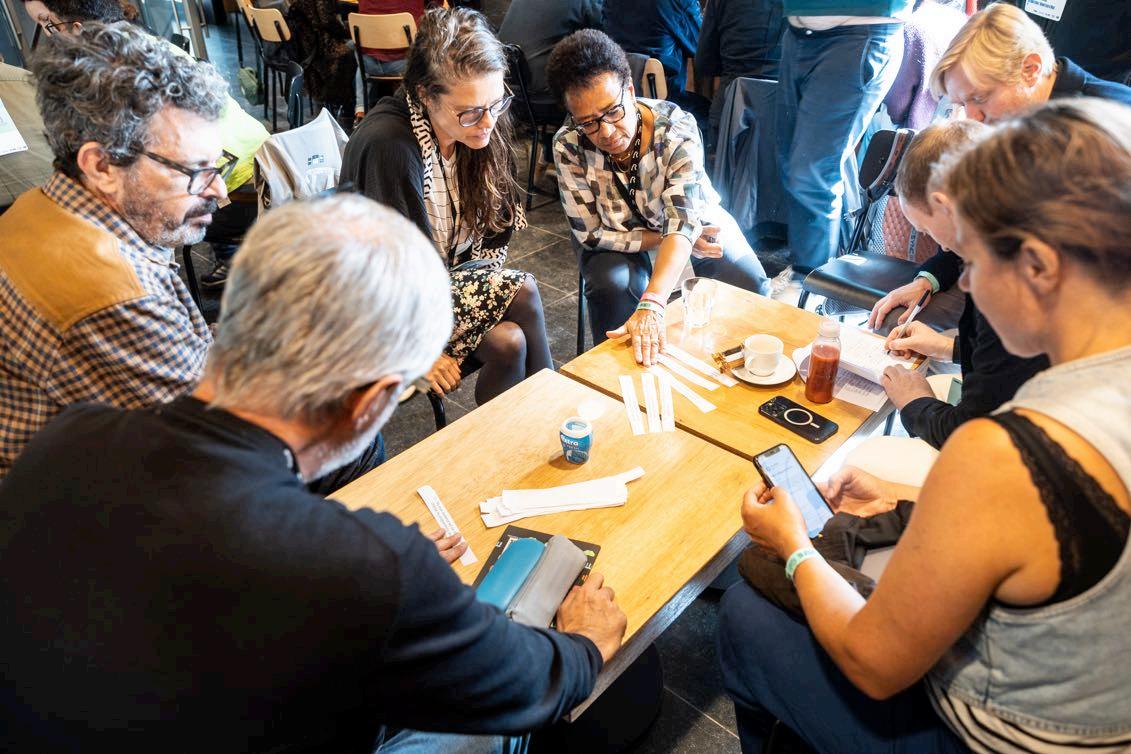
Janine explained that her role (in conjunction with co-founder Gary Crosby) as a curator of both performance and education comes with responsibilities—whose stories are you relaying, and what repertoire are you presenting? “How do we build community around all of these things?”
Janine said that a curator has to understand that sometimes he or she may not be the target audience, and in such a scenario the curator has to able to let go of the reins in favour of someone better placed or with better experience (for example, lived experience with a particular community) to steer the curation. Trust, she said, is key. The musicians also need to have agency, Janine added.
Martyna made a point of identifying socio-economic barriers to inclusion, as well as technological ones—not everyone has a Smart phone or is able to buy tickets online. She mentioned the Nuejazz festival in Germany, which has as one of its missions to reach new audiences.
Frank then described the route from joining a local jazz association to founding the Nuejazz Festival in 2014. As musicians themselves the organisers understood the importance of making the musicians feel comfortable with everything. They decided to utilise the sort of venues typical of pop and rock gigs. Students from the local university designed the visuals, a tradition that continues to this day.
In an effort to attract youngsters Nuejazz Festival staged children’s concerts weeks before the festival and then invited them all to children’s concerts programmed during the festival itself. This brings families to the festival. A weekly jazz session organised by students from the university jazz department is always well attended. This combination of initiatives has resulted in festival audiences of very mixed ages.
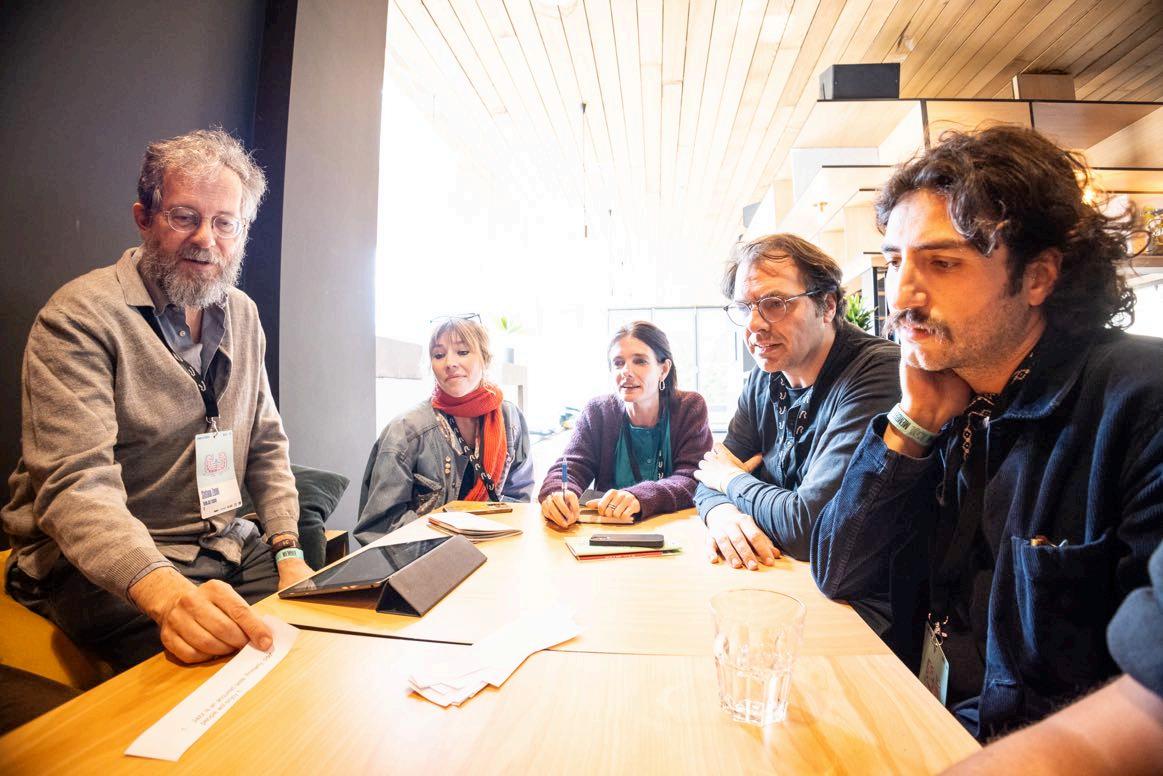
Regina added that young people are also interested in who is behind the festival, whether or not they are people they can identify with. This aspect of audience development is “super important,” she said. The room was then divided into tables of up to eight people. Statement cards on the tables were designed to stimulate discussion around audience diversification.
Ideas that surfaced during the group brainstorming sessions included:
• Involving young artists may attract young audiences;
• Intergenerational programmes encourage intergenerational audiences;
• Greater flexibility regarding where music is presented (imaginative outreach);
• Communication via social media and also by old-school posters;
• Young people should be the ‘face’ of the festival.
On the latter of the above point someone said that if middle-aged or grey-haired curators promote their festival on Instagram or Tik Tok the viewer will not get to the end of the first sentence. The same person mentioned the Beethoven festival in Bonn where they employed a young journalist (in his/her early 20s) to promote the festival via video and interview people. “That’s interesting. People can maybe relate more to that. The messenger is really important.”
A second round of brainstorming, with people having switched tables, raised a couple of notable ideas:
• Ticket pricing must be affordable to all pockets (free stages/gigs and token one-Euro tickets also);
• Work with diverse communities to engender projects they have agency in as co-creators.
This animated discussion group demonstrated that different festivals employ different strategies to attract diverse, intergenerational audiences. It also underlined the value of people coming together to compare ideas and share best practices.
Three young artists and activists shared their environmental concerns, their concerns regarding the music industry and the socio-economic disparities that only seem to be widening in our societies. In a wide-ranging discussion the panellists, artist Kateryna Ziabliuk (UA/PL), artist and activist Frederike Berendsen /FRÉ (NL) and rapper, sociologist and youth worker Fatih De Vos (BE) spoke about access—and barriers to—the arts, engaging with youth, institutional challenges and gave examples of best practices in making music a more inclusive environment. Writer and broadcaster Anna Umbina (UK), a seasoned professional in the fields of training, professional development, access and youth projects, moderated the panel discussion.
After briefly introducing themselves, Anna began by asking Fatih about access to venues for young people in Ghent. Whilst programming in the arts in Ghent is very multi-cultural, Fatih said, but such diversity is not witnessed in the distribution of power and means.
Speaking of his and his friends’ experience growing up in Ghent, (friends “mostly of colour”) Fatih said that the clubs were closed to them and that he only gained entry later as a hip-hop artist and rapper. When asked about the reason for the earlier exclusion Fatih replied: “Everyone experiences exclusion in their own way,” leaving unsaid the subjects of racism and economic disparity.
He continued by saying that many organisations are aware of the need to work towards safer spaces and greater democratisation in venues but at the same time there is still much work to be done. The word “inclusivity” is bandied about very freely by some organisations, though Fatih suggested that for some of them it is little more than “window dressing.” Structural change is
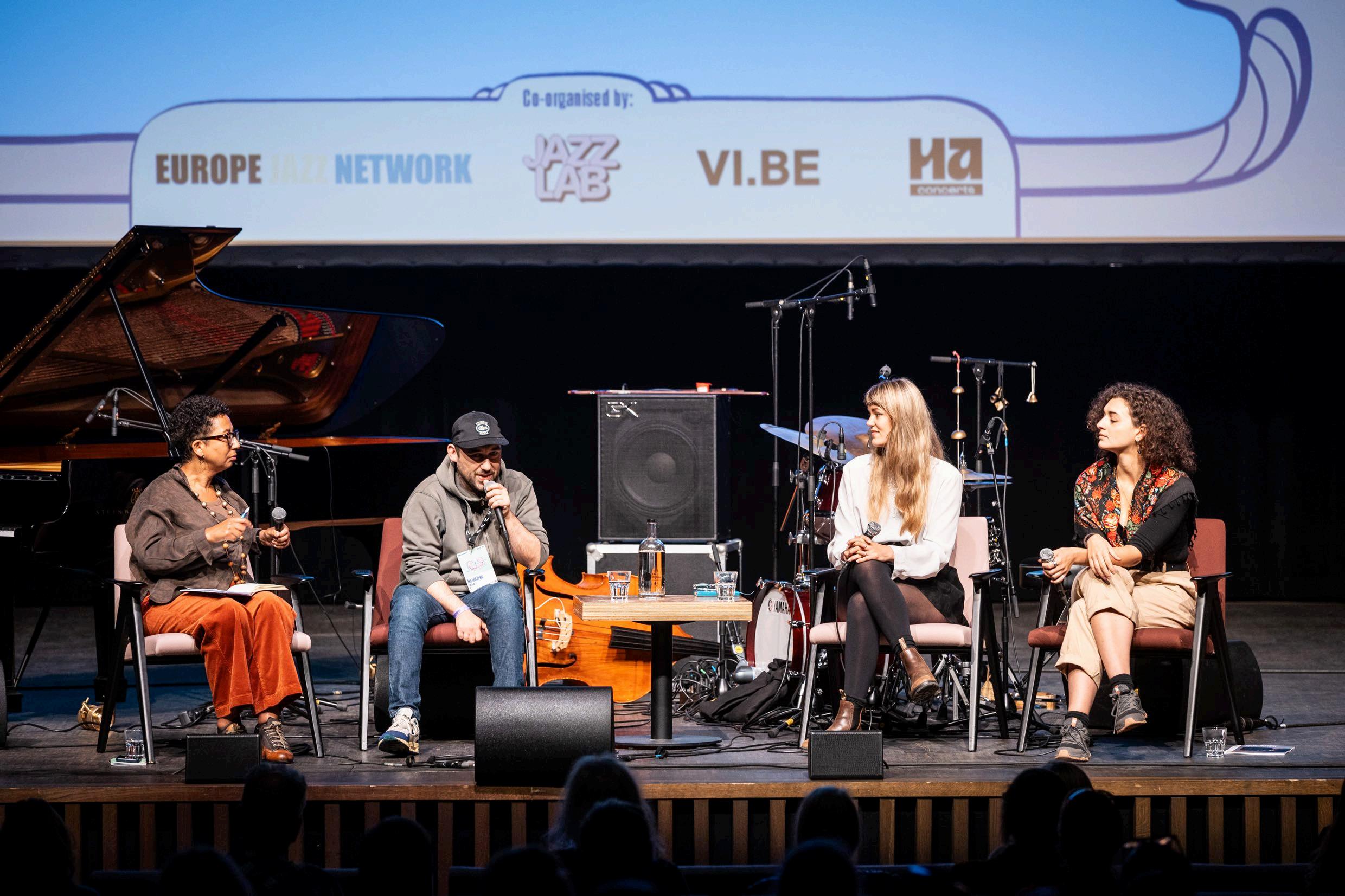
In speaking of his own circumstances as the son of Turkish and Belgian parents Fatih alluded to the struggles faced by many immigrants and children of immigrants who face variously issues of identity, rejection and lack of a wider family support network. Fatih explained that he had grown into the role of working with youth as his own experiences have enabled him to relate well to them.
Anna asked him to give an example of a project that has worked in engaging with youth. Fatih described how hip-hop connects well with youth, being quick to distinguish between the hip-hop culture stemming from the 1970s—an inclusive, progressive and counter-culture music—and the misogynistic, material-obsessed hip-hop culture engineered by the music industry purely for profit from the 1990s onwards.
Fatih talked about trying to integrate hip-hop culture more broadly across the arts and specified the “A School Called Tribe,” where young hip-hop artists get together with students from Ghent university’s jazz faculty. In different ways both parties are a little out of their comfort zones but striving to meet in the middle and produce new music by compromising, experimenting and communicating can be beneficial to all. “You cannot solve everything with hip-hop… but you can solve a lot with hiphop,” Fatih said.
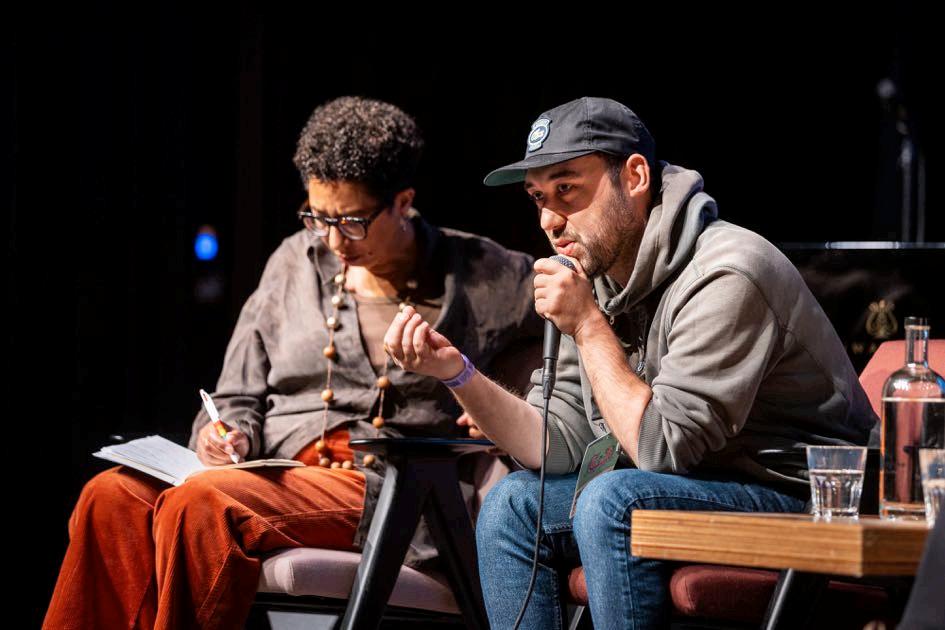
Kateryna, Ukraine-born but living in Poland for a long time, spoke about her own experiences trying to connect different musicians and in promoting specifically Ukrainian artists. She expressed her disappointment at promotors who are afraid to take risks, a conservative stance that diminishes the arts. For Kateryna art by definition is about taking risks and exploring the new, even if this sometimes makes people feel a little uncomfortable.
It is a way, she said, to raise awareness of the urgent issues in the world today related to politics and war etcetera. But because of “safe line-ups” at festivals there is generally no place for Ukrainian artists who wish to raise awareness about the war with Russia. Anna agreed that the music should be used and promoted to educate society about fundamental issues that affect us all.
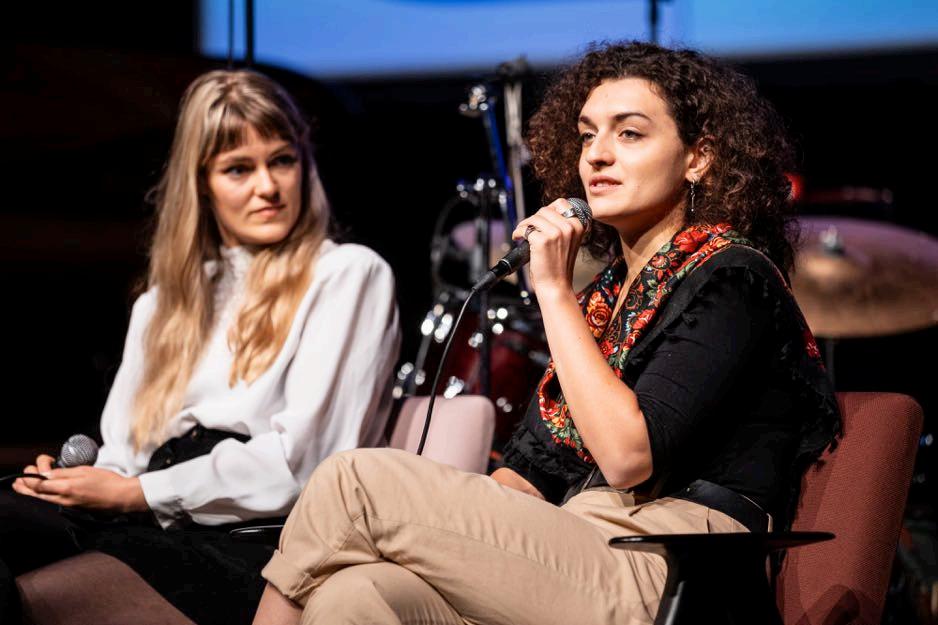
One notable exception, Kateryna said, is Hannibal Saad‘s Culture Unlimited Festival, which uses music to highlights topics such as water shortage and the Syrian conflict. “Through music people become more conscious about what is happening in certain regions of the world.”
Kateryna expressed her hope that there will be more opportunities for such activist-minded artists.
Bringing Frederike in, Anna asked her for positive examples of projects making a di ff erence. Frederike spoke about the international organisation Music Declares Emergency (MDE), created by one of the founders of Extinction Rebellion (ER), which attempts to spread the same message
as ER but through different, less radical means. MDE uses music to promote cultural change “because it speaks to the heart. It can spark the imagination.”
No Music On A Dead Planet reframes the conversation around climate change by asking people to think about exactly what it is they are fighting for and to imagine the world they wish to live in. “What do we love? What do we want to keep?” should be the questions we ask ourselves, Frederike said. If we want to keep summer festivals in the Netherlands then we need to change things, because if we do not, in fifteen years it will be too hot for summer festivals with outdoor camping. To avoid environmental disaster (or to adapt to it) people have to work together, and for that happen, Frederike said, they have to feel connected.
Frederike explained how she gives artists advice on green touring and sustainable practices for an entire career. A podcast recorded live at festivals aims to bring promoters and artists to a better understanding of their respective needs and limitations regarding sustainability. No Music On a Dead Planet also tours festivals and has a stand that delivers fake tattoos for all that “creates a triangle between festival, artist and music lover all expressing the same thing.”
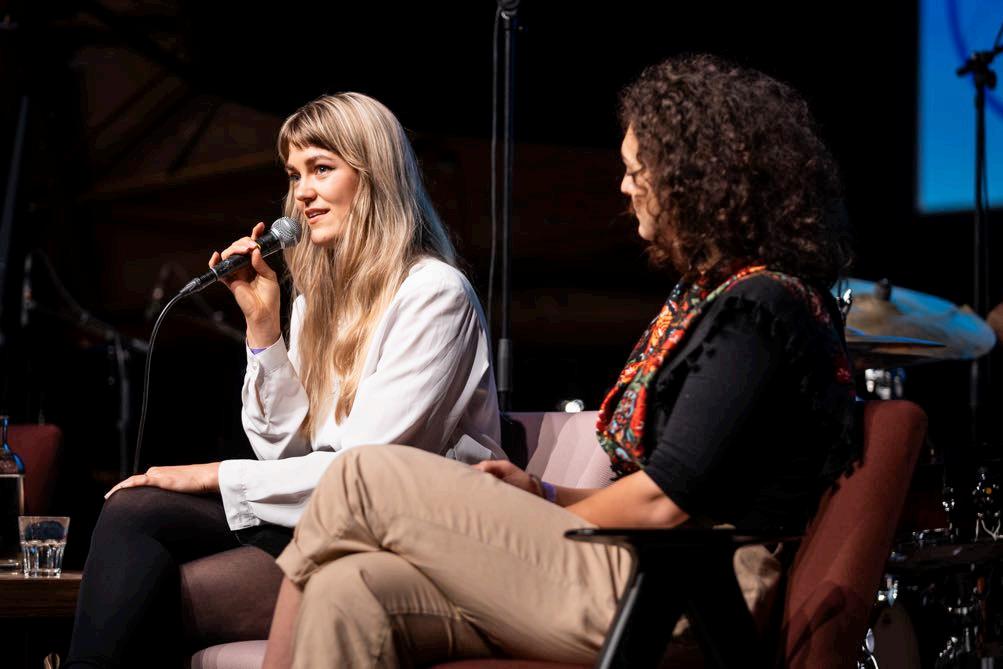
Raising consciousness is one thing, practical steps another. Anna asked Kateryna about her experience of green touring in Ukraine on the Green Pilot Tour, an initiative of the EJN. Kateryna spoke of the relative ease of touring a quartet by train in Ukraine, thanks to the advanced rail system. She remarked upon the tremendous enthusiasm of the audiences there for improvised music. However, she tempered this enthusiasm with doubts about the viability of touring by train throughout Europe, citing the complications caused by delays, cancellations and strikes.
Frederike concurred, adding that there are multiple ways to tackle the environmental crisis, and that one method might work better for a particular artist while another method might better suit another artist. Fatih responded by saying that the environmental crisis and the social crisis are not separate issues. “It is one big struggle. It is a question of redistribution,” (of power and money) he said, reasoning that only through structural change can social change be brought about. He stressed that this is a long-term project, saying that the institutions and the activists need each other to effect major change.
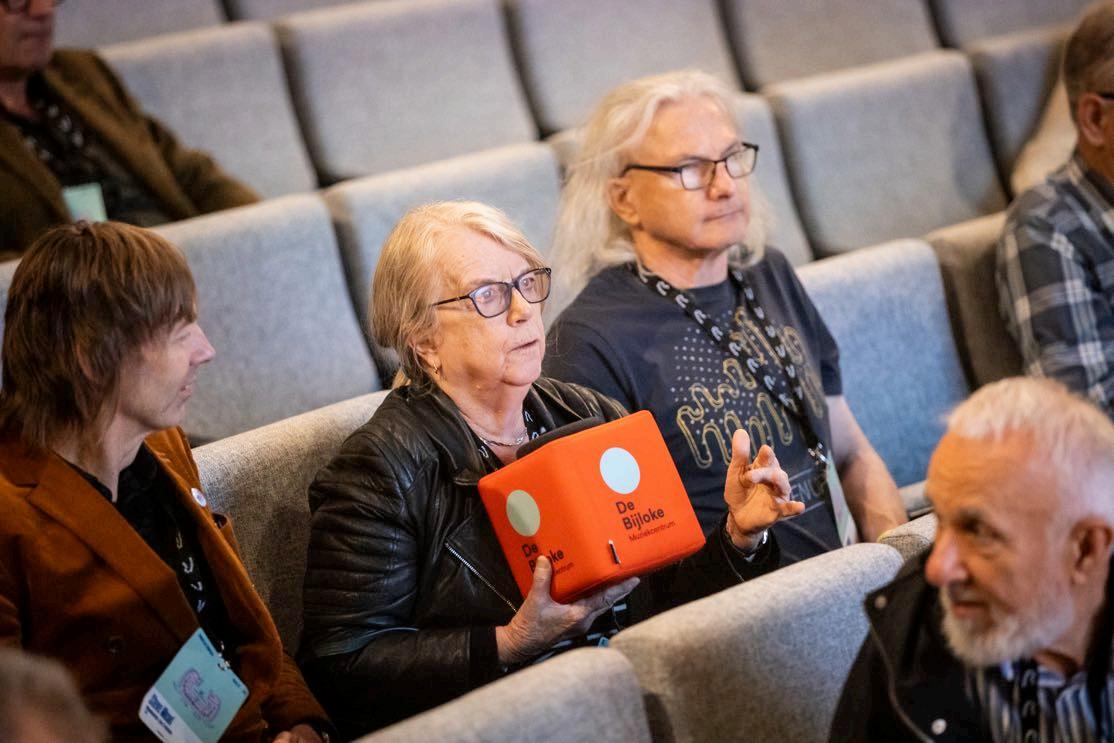
Frederike urged attendees to talk to their neighbours, their friends and work colleagues about these issues, saying that people are far more likely to have their opinions swayed by someone close to them, even if the conversations are sometimes uncomfortable. “That actually creates a ripple effect and that really helps.”
In the Q&A that followed, Ros Rigby, former EJN President, asked Kateryna if the resistance she has encountered with
bookers has changed since the war with Russia. Kateryna replied that there was a lot of support from many countries in the aftermath of the Russian invasion. She said that the wave of interest and support must not be allowed to diminish, though she recognised that it requires great effort to maintain.
A Swedish attendee remarked how a poll showed that a large proportion of 18-year-olds in Europe are voting for the far-right. If it seems that we are failing them, what can people in jazz and progressive music do to reach them? Frederike answered by saying: “My understanding of jazz is protest. It’s an activist music … maybe as artists and as promoters we can be a little more courageous with our activism.”
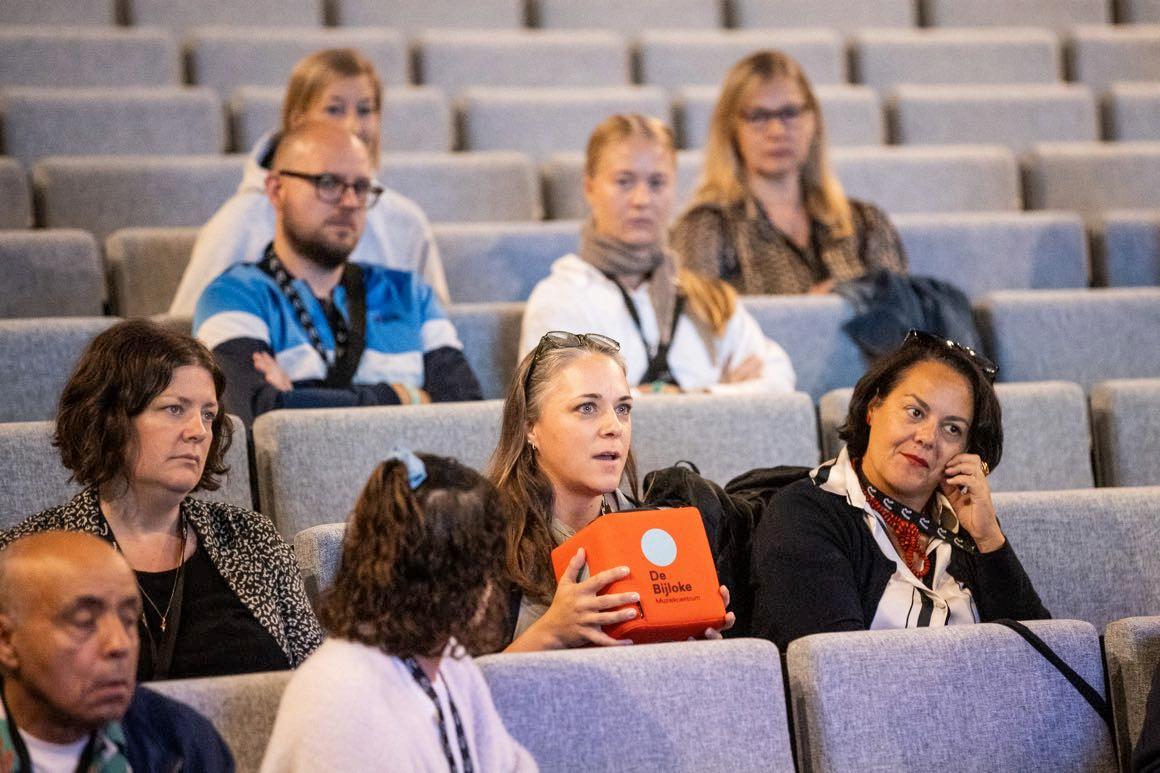
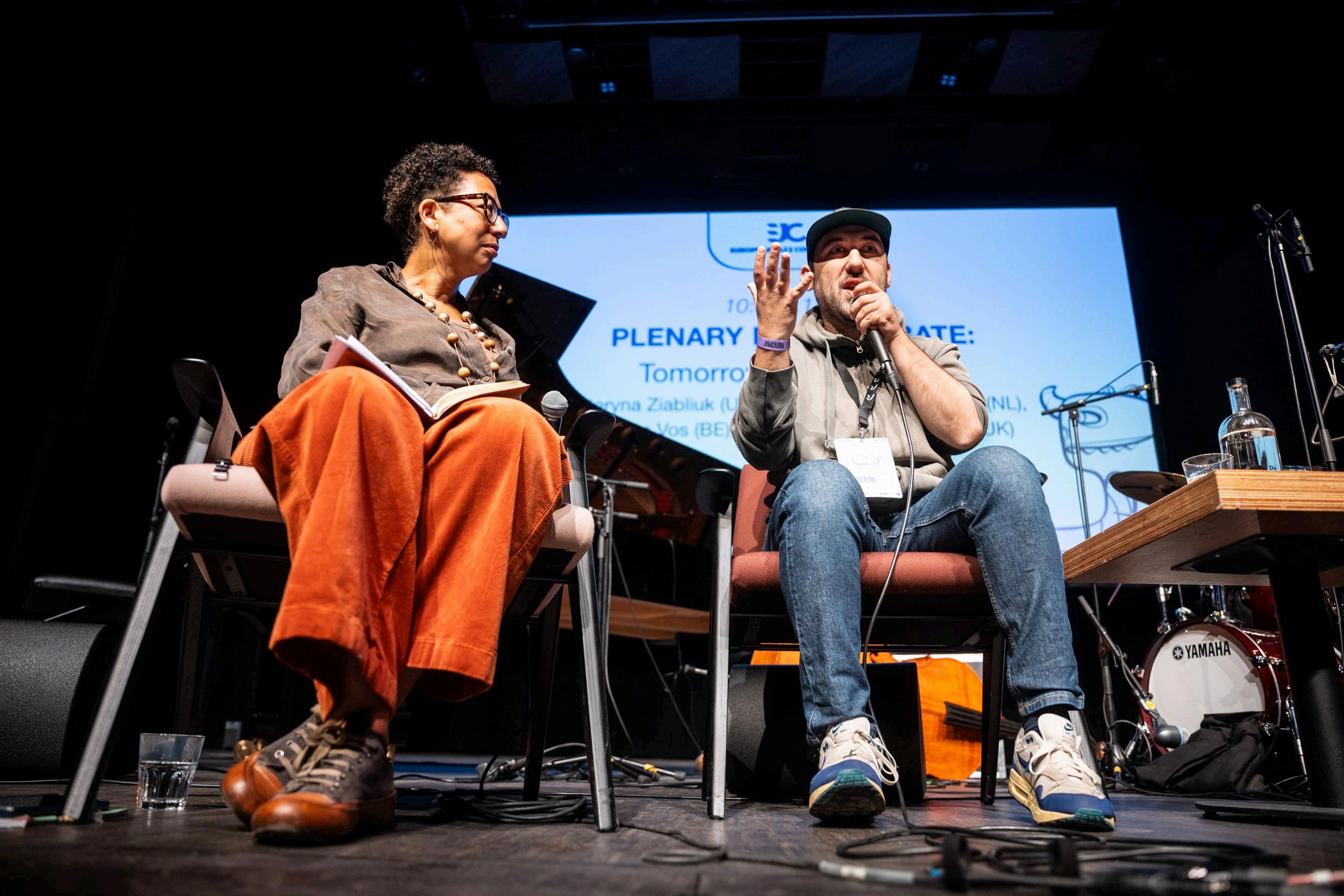
Anna thanked the three panellists, who made way for Wim once again. Adding his own thanks to the panellists and to Anna for an excellent discussion Wim then introduced the EJN Awards and invited Giambattista to present the first award for Adventurous Programming.
The award, now in its 13th year recognises the work of a promotor who exemplifies the values of EJN. The winner was selected via a two-phase process which began with each of the EJN’s 200 members indicating a potential winner, though not necessarily an EJN member. The second phase saw an EJN jury selected by the Board of Directors as well as other esteemed music professionals (musicians, journalists and festival directors) meet on-line in June 2024 to choose the winner from a list of 22 nominated festivals, clubs and concert venues.
Giambattista then invited to the stage the winners of the 2024 EJN Adventurous Programming Award—Budapest Music Centre (BMC), from Hungary. Giambattista then read the statement from the jury, which recognised the BMC’s plurality as a venue, record label and archive, its commitment to the freedom of expression as a democratic right and its commitment to promoting music beyond borders and above day-today politics.
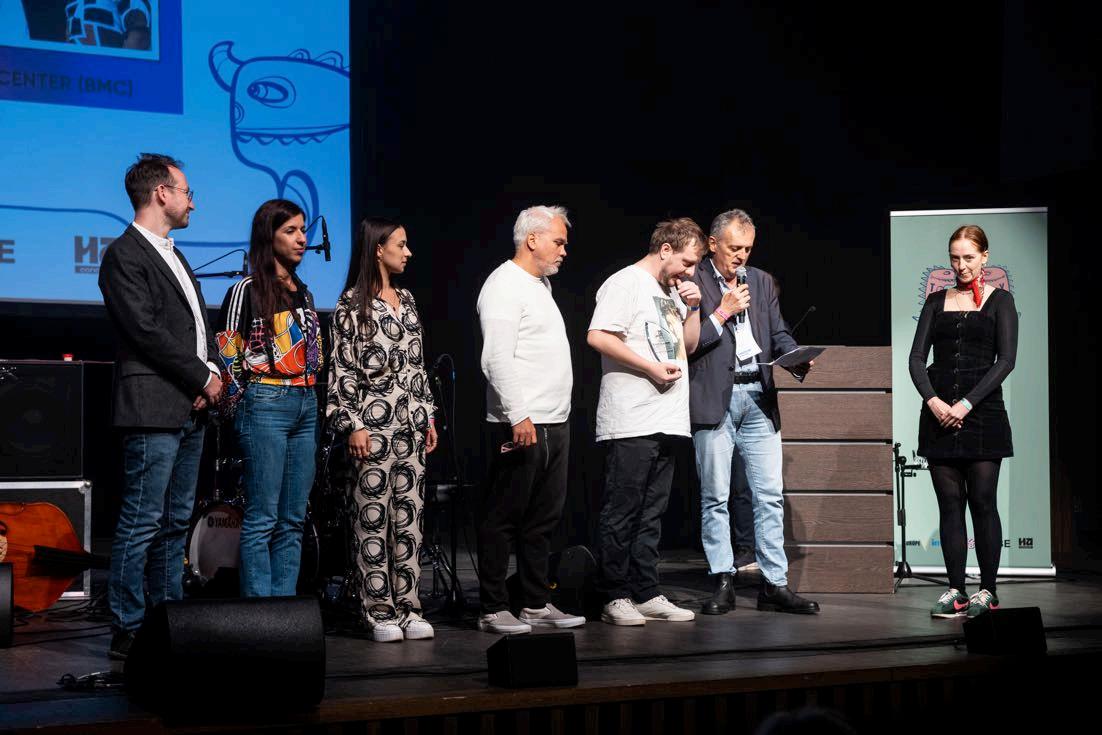
Accepting the award, BMC’s Zsolt Hernádi thanked the jury, the EJN, colleagues present and past and those at home in the BMC who were unable to attend. He also thanked everyone “in the jazz community” in Europe and beyond its borders. He reserved special thanks to BMC founder László Gőz, to György Wallner, whom he described as a mentor to everyone, and to the late Peter Eötvös.
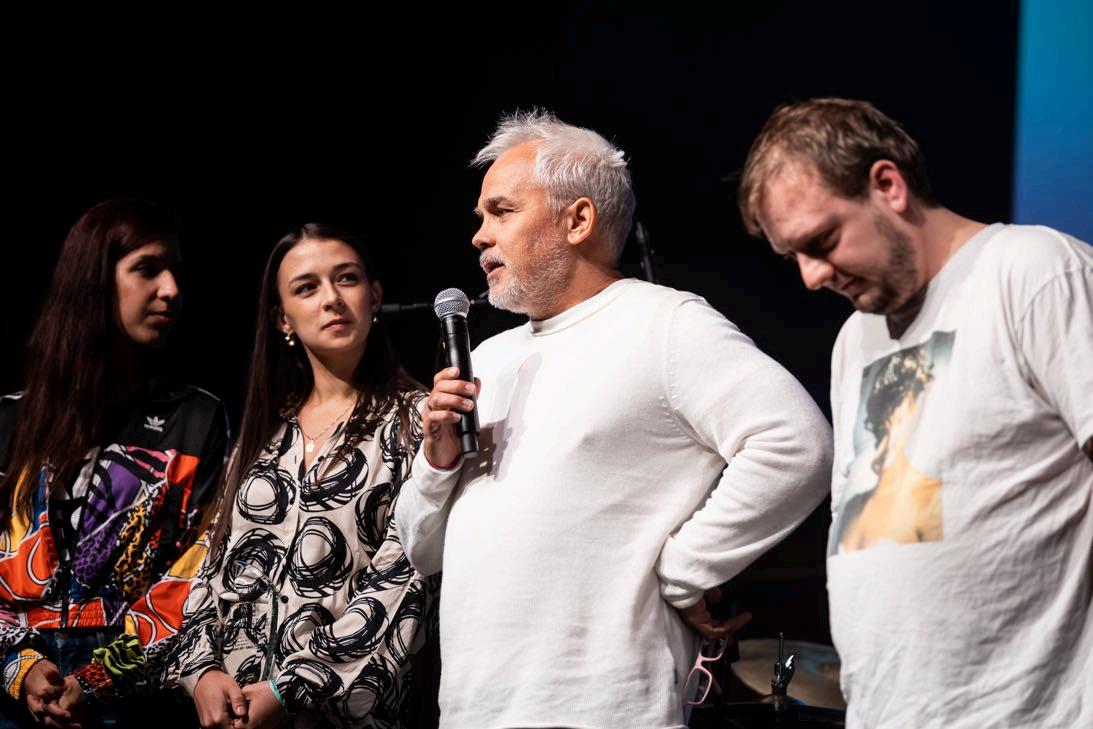
Tamás Bognár then took the mic, saying that the award is the result of a team effort. He acknowledged the support throughout the years of the EJN which he described as “crucial for us.” Jazz, said Tamás, may be about protest and other things as well, “but above all it is about love. We truly believe that we are sowing the seeds of love.”
Wim then introduced the EJN Award for Music & Community. Since 2018 the EJN has recognised a particularly outstanding project working on social inclusion through creative music. For the first time, the 2024 award was the result of an open call to organisations (also those not belonging to EJN) to share their practices with a five-person jury.
The jury report recognised not one but two outstanding projects: Taller Obert, by Taller de Músics (Barcelona, Spain) which uses music to socially integrate the homeless, vulnerable and refugees; and Bunkern Bokar (Gothenburg, Sweden) which trains and integrates people with disabilities into the creative workforce.
The jury recorded Taller Obert’s use of music “as a route for positive change.” With regard to Bunkern Bokar the jury praised its “essential support for career development.” The jury also noted the excellent work of two further organisations whose work aims to break down barriers to social inclusion, Ledebirds Orchestra (Ghent, Belgium) and Współgłosy Foundation (Łódź, Poland).
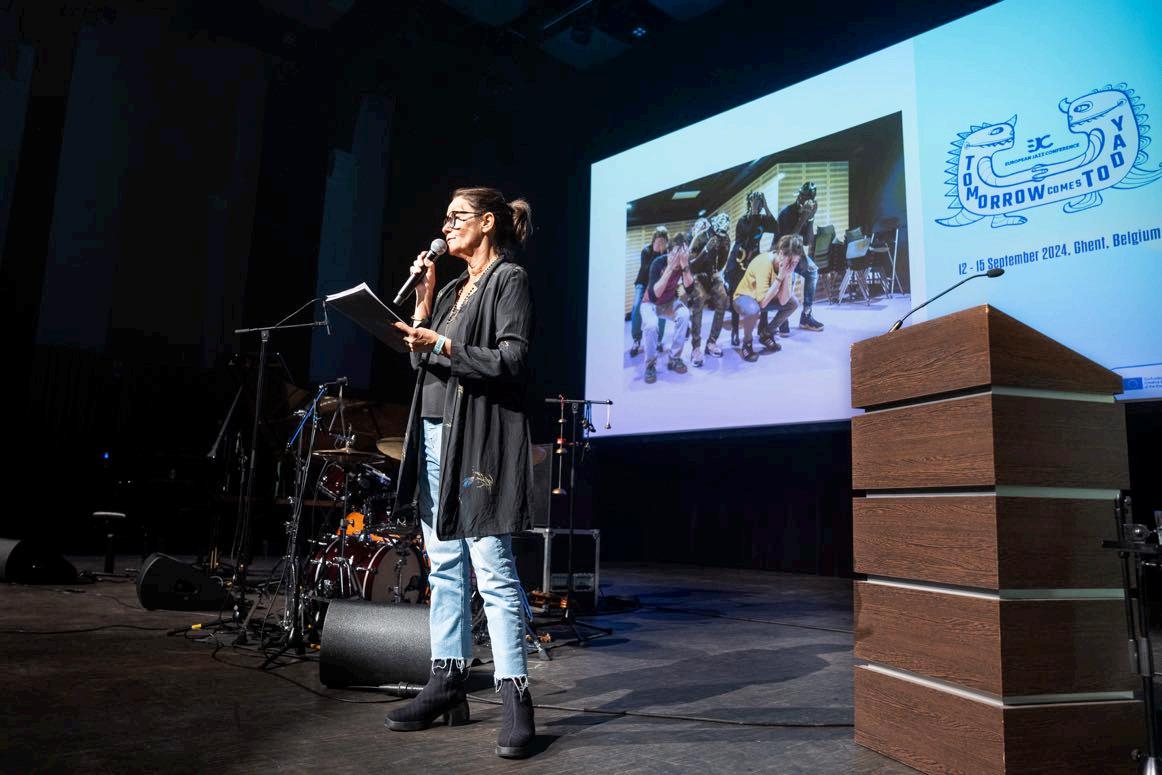
Accepting the award on behalf of Taller de Músics, Rosa Galbany expressed her gratitude for the recognition of work “that is not easy to do, but it changes people, and it changes their lives.” A short video showing the work of Taller Obert was then projected.
Wim then called Bunkern Bokar’s Ebba Westerberg to the stage. Accepting her team’s award Ebba outlined the organisation’s work, both as a booking agent for musicians in Sweden, and in empowering people with disabilities by training them to access the workplace. “It is a very meaningful job, and I feel very happy to do that,” Ebba said. A short video outlined Bunkern Bokar’s work.
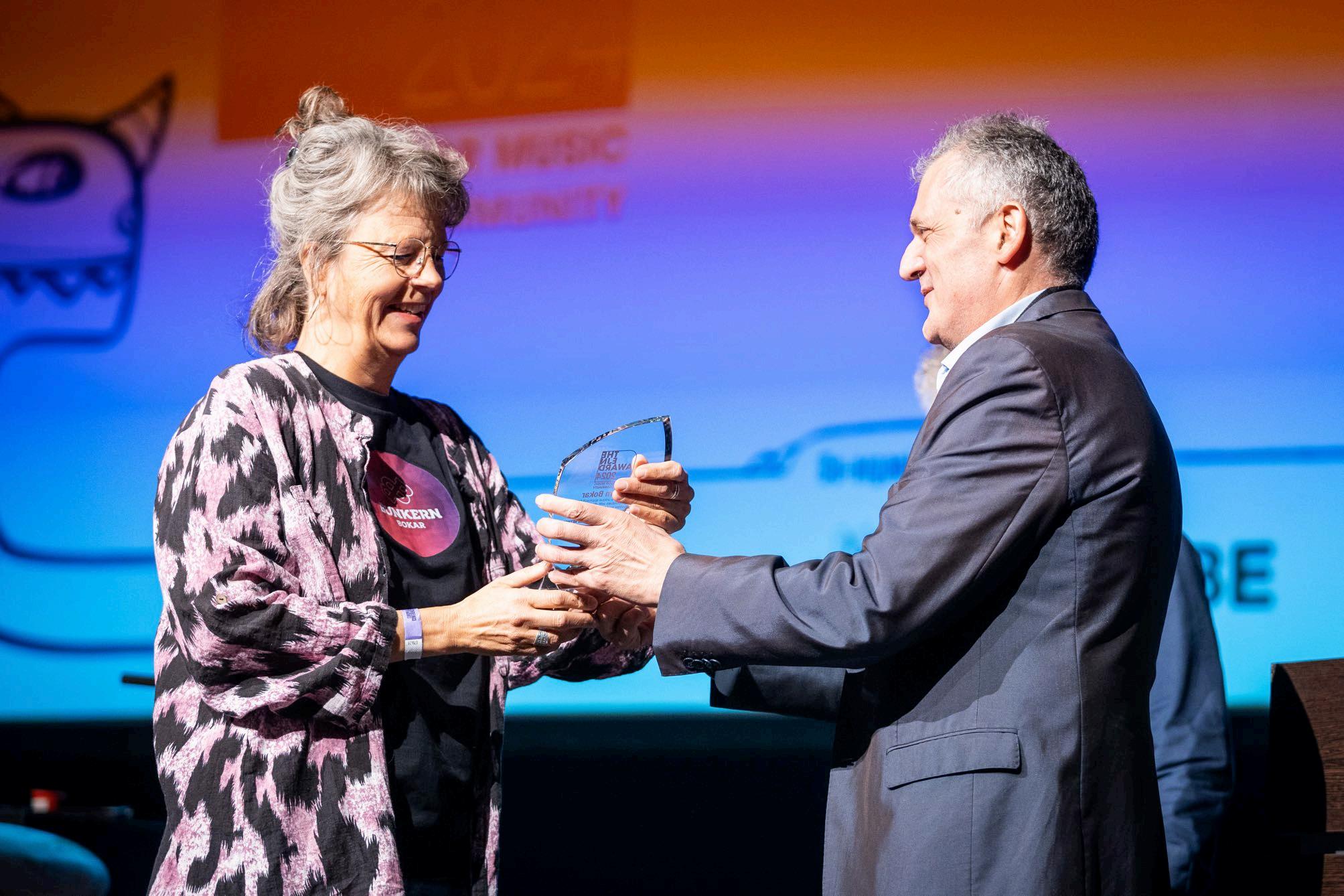
Giambattista then called Ragnhild Menes (NO), board member of Norsk Jazzforum, to announce the EJN Zenith Award (in conjunction with 12 Points Festival). Ragnhild extended her personal congratulations to all the winners thus far and then paid tribute to the winners of the Zenith Award, Liv Andrea Hauge Trio. Ragnhild spoke of her pride in the diversity of the Norwegian jazz scene and mentioned the digital release of the 2024 edition of the ongoing compilation series Jazz Out Of Norway, which features 30 contemporary Norwegian jazz acts.
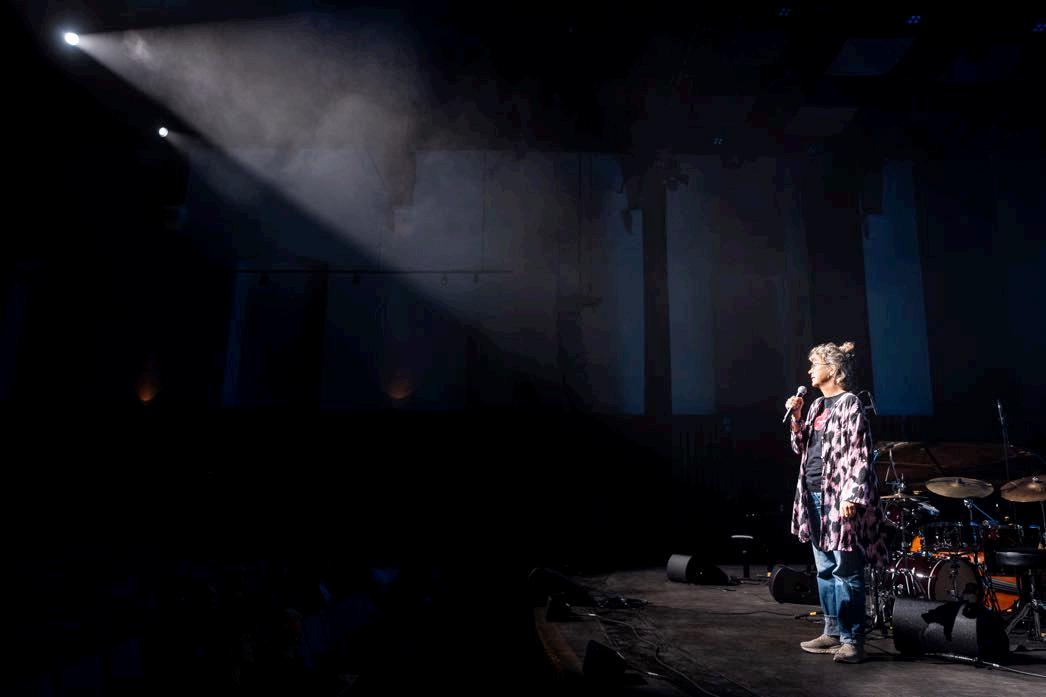
The Liv Andrea Hauge Trio had been announced as the winner of the Zenith Award for emerging artists earlier in the year. The jury, she related, admired the young trio’s musical maturity, its beautiful melodies and outstanding interplay. She then invited the trio to the stage. Liv thanked the EJN, its staff and everyone who helped the trio with the Zenith Award tour. The trio then played a short but captivating set from its album Ville Blomster (Hubro Music, 2024).

Following the performance by Liv Andrea Hauge Trio, Lize invited all the EJN members and guests to assemble in the gardens of the Music Centre de Bijloke for the traditional conference photo. Expertly shepherded by the microphonetoting photographer and helpers, the photo shoot passed off in record time. Lunch then followed.
There was an additional discussion session outside of the main programme, the initiative of Xavier Lemettre (FR), Director of Banlieues Bleues. Alarmed by the rise of the far-right in many countries of Europe, Xavier proposed a meeting to discuss the dangers it poses to our societies and to our cultural programmes. A room was set aside and the meeting, attended by around twenty people took place during free time/ networking time immediately following the conference wrap-up.
With no formal agenda, this meeting served rather to allow people to share their thoughts and experiences of the far-right in their respective countries and across Europe as a whole. As a first step in perhaps persuading the EJN to formalise a response, this was more of a brainstorming session than anything else, but a number of ideas were aired. There was a willingness among attendees to volunteer their time and energy to be part of any committee or think-tank going forward.
Several people noted how savvy the far-right is in manipulating social media to recruit people to its cause and to push its agendas, something that Frederike Berendsen had mentioned during the Plenary Debate earlier in the day. A potential and specific EJN manifesto (or adding EJN’s name to an existing European anti-far-right manifesto) were suggested, ideas for further debate going forward. There was general agreement that the forces of liberal democracy need to use social media better in order to counter extremist ideologies.
The traditional wrap-up for this year’s edition of the EJC came from An De Bisschop (BE), an experienced researcher, educator and academic in the field of socially engaged music practices.
An’s summary centred around quotations that she had gathered over the course of the conference. From Lisette Ma Neza’s keynote speech An gleaned the message that despite our different pasts we share the same hopes for the future. Lisette’s reference to the Rwandan genocide and how it affects the present and the future was reflected in the quotation: “May we create hope from all this concern.”
Hope for the future, for the future of youth, was a recurring theme of the conference, An observed, but so too were the challenges facing the sector. These overlapping themes arose in the afternoon discussion sessions. From the session Curating for Young People, An highlighted the Torino Festival, which programs also for young people, making the music accessible to the young by offering tickets for 1 Euro.
Referring to the session Nice Work If You Can Get It, An touched upon the challenges facing young people interested in working in the sector. She quoted one attendee who said: “An entire industry thinks that young people work as volunteers or internships, and they can be hired for free … I don’t think this is the kind of industry we want to build.” An observed that just and fair working conditions are important for the sustainability of the sector.
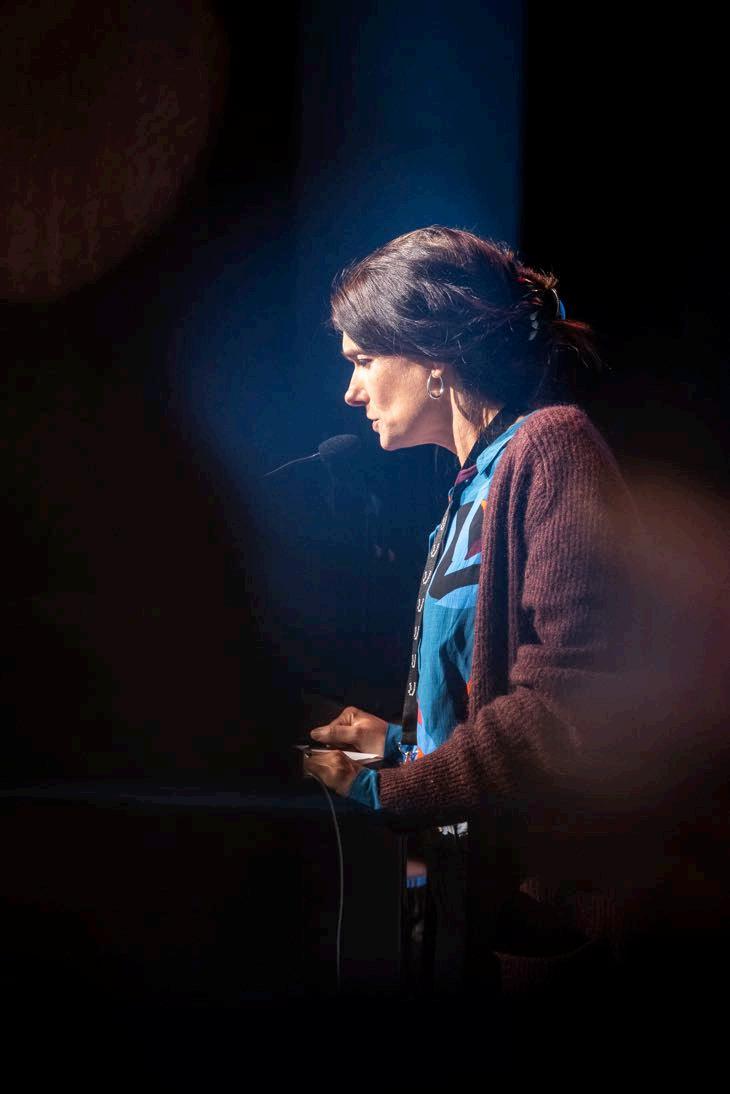
Economic sustainability goes hand in hand with environmental sustainability, another theme of the EJC 2024, and one discussed in The Future Is Green group. But the quotation that caught An’s attention the most was not from that session, but from Saturday’s Plenary Panel Debate, where Fatih De Vos noted: “On the one hand you have the climate crises and on the other there is the social crisis and growing social inequality. A lot of people forget how these two are interrelated.”
With regards to new technology and what they may bring to the sector, An plucked a quotation from the session The Invisible Hand, which discussed the role of Artificial Intelligence: “AI provides us with opportunities for administrative tasks and other executive work. This leaves us with more time to do the creative work.”
From the discussion group Tell Me A New Story, which addressed the need for jazz to better communicate with young audiences, An recorded this quotation by Angieszka Kiepuszewska: “For me, it is important not to lose our own truths. Instagram is the best example of a world that does not exist. But for people it is important to have something that is true and authentic for
people to hold onto; Music has this.” These words resonated with An, who recognises music as a basic human need.
In conclusion, An returned to the Plenary Panel Debate, and the messages that arose about the need to embrace risk and adventure in programming, of the need to reframe the discussion around climate change to effect more positive outcomes, and of the need to be aware of one’s own privilege and power and to use it positively. An invited the conference attendees to reflect upon these messages and to think about ways in which they can act as individuals today in order to make a brighter tomorrow.
Giambattista thanked An for her perceptive summary of the conference. He reminded attendees that the conference report covering all the sessions, talks and presentations would be published at the EJN website within a month or so. Giambattista also asked attendees to kindly respond to the conference evaluation questionnaire, which would be sent to their email addresses when the conference had concluded.
Giambattista then took the opportunity to give an overview of the EJN’s relationship with Europe. He summarised the EJN’s history to date and its funding applications to the European Union, most recently Creative Europe, which have enabled the EJN to grow and to thrive. He invited EJN’s project officer Olga Sismanidi (BE) to say a few words.
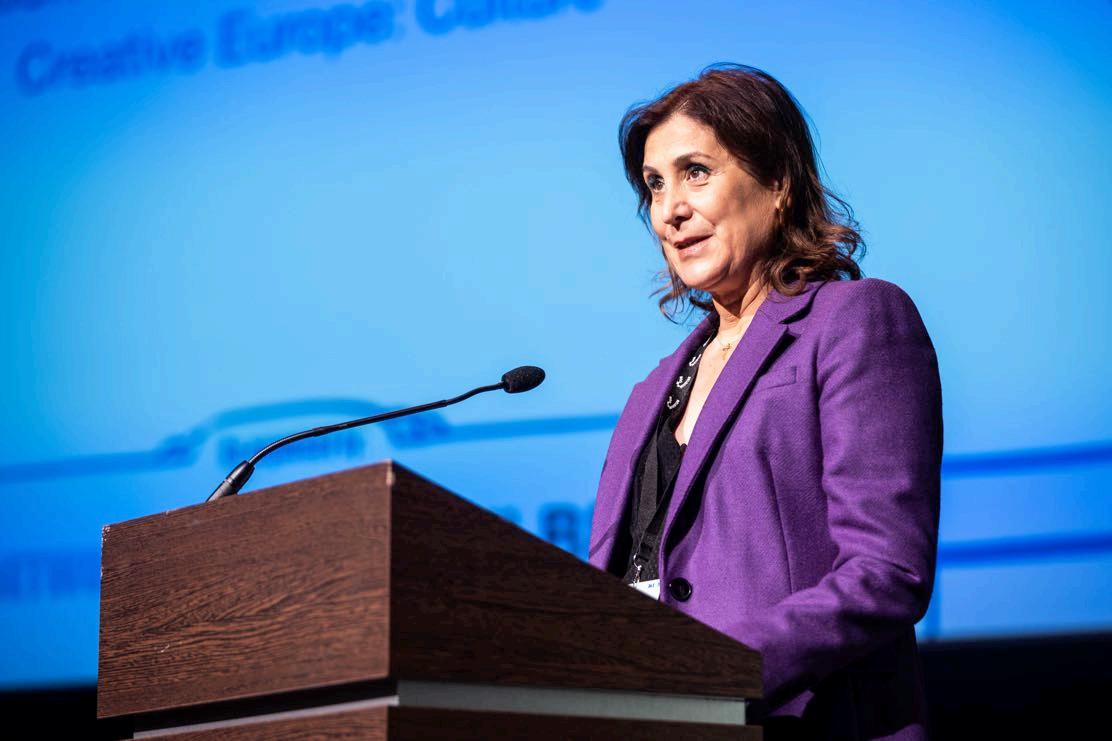
Olga congratulated the EJC on its 10th anniversary, noting that Creative Europe is also celebrating its 10th anniversary. She spoke of the promise and the urgency of our times when it comes to youth and their role in shaping the future of our music and our societies. She noted the bold ideas and dynamic exchanges that she had experienced in the talks and presentations that she had attended at EJC 2024.
Jazz, Olga said, is in Europe’s DNA. The music is always pushing boundaries, which also happens to be Creative Europe’s motto. Jazz challenges conventions and embraces change. It is a music of “diversity, innovation and inclusivity,” values that are also central to the European Union for the creative and cultural sectors. Olga spoke of Creative Europe’s pride in nurturing these values through co-financing projects—networking projects, European platforms or translations of literature. “At Creative Europe we are deeply committed to nurturing the creative and cultural sectors across Europe and beyond.”
EJN and Creative Europe have a common purpose, Olga said, one that is reflected in the conference title, Tomorrow Comes Today. Creative Europe and EJN’s partnership enables the cross-border collaboration of artists, promoters and cultural managers. The aim is to create a framework for art to flourish regardless of geography.
More than just professional alliances, EJN and Creative Europe’s other networks (37 in total, 10 of which are dedicated to music) “are ecosystems of creativity and resilience … that continue to inspire new generations.” Creative Europe’s financial commitment to these networks amounts to 10 million Euros over a period of three years. The success of the EJN over many years, Olga
noted, has made it one of the founding pillars of the Creative Europe programme. She extended her congratulations to the EJN for its record.
In the previous financial cycle (2014-2020) Creative Europe co-financed 130 projects of the music sector to the tune of 100 million Euros. Between 2021-2023 Creative Europe has overseen a further 24 music projects across Europe at a cost of 28.5 million Euros. A further 50 projects were funded at a cost of 25 million Euros as part of the Music Moves Europe (MME) project which has benefited around 60 small-scale music initiatives. Music, Olga surmised, is at the centre of Creative Europe’s funding.
In conclusion Olga stated that it was everyone’s responsibility to ensure that the cultural sector is a space where the youth of today and tomorrow can thrive. The EU’s focus on youth “aligns perfectly with the work of the EJN,” Olga said, adding that the EJC’s encouragement of intergenerational dialogue and inclusivity ensures that the voices of youth are “heard, respected and acted upon.”
The EJN’s commitment to social and environmental causes also aligns with the EU’s concerns, Olga said, citing the EJN’s Green Pilot project for greener touring. EJN was recognised as a leader in the fi eld of sustainability when its Green Pilot project was cited during the Belgium Presidency of the Council of the European Union, in Ghent, as an example of best practice in sustainable touring. “This is a powerful example of how culture and the music sector can take concrete actions in line with EU priorities and the agenda to set the standard for the broader creative industries,” Olga said.
Olga described how Creative Europe’s music platforms give young emerging artists the opportunity, resources and the visibility they need to advance their careers. In short, Creative Europe thrives on the synergies between networks, platforms and other funded projects. These synergies enable connections between artists, promoters and institutions that amount to a cultural ecosystem that benefits both emerging artists and the whole music ecosystem throughout Europe.
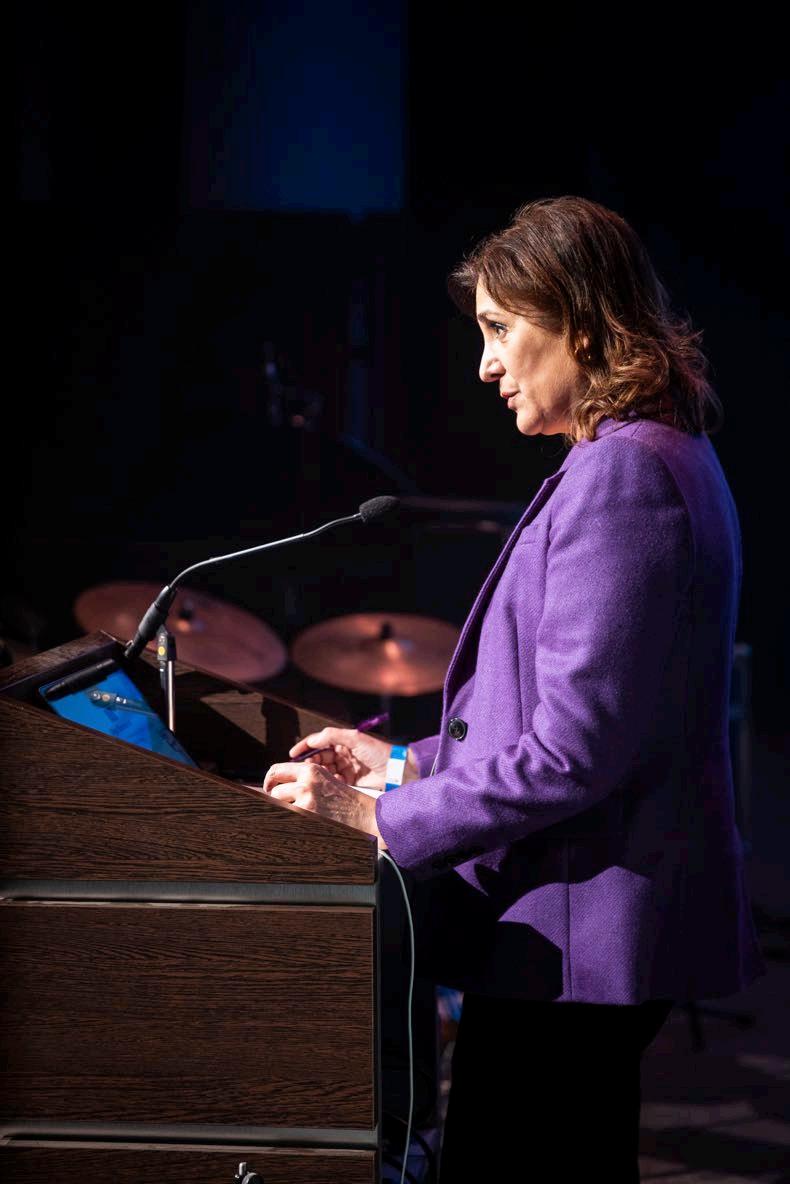
In conclusion Olga congratulated the EJN for its work in promoting innovation and inclusivity. She noted that the conference title, Tomorrow Comes Today, is a call for action. The future, Olga said, is about listening more, learning more and creating together. Olga thanked the conference attendees for their attention and wished everyone the best for the future.
Giambattista thanked Olga for her presentation and proceeded to announce that the destination for the EJC 2025 would be Bari, Italy, from September 25-28. He then invited Maddalena Ciocca (IT) from Puglia Sounds to the stage to make a presentation on the EJC host city for 2025.
Maddalena introduced her co-presenter, Claudia Sergio (IT), General Officer for the Regional Cultural Strategy Project, and mentioned that Puglia Sounds has been part of the EJN family since 2010. Its active membership has enabled Puglia Sounds to better promote nationally and internationally Puglia’s musicians and Puglia’s musical culture.
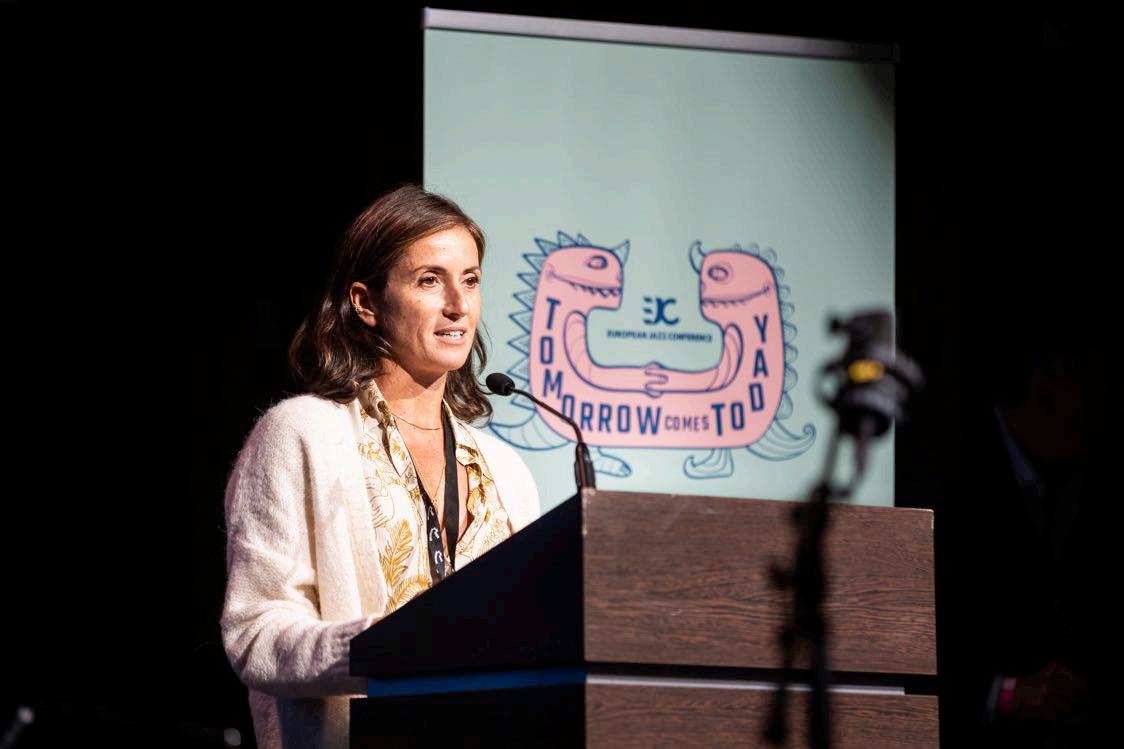
In 2012 Puglia hosted the EJN’s General Assembly in Bari and since 2013 has collaborated with various EJN members to showcase the best of Puglia’s music scene, notably Puglia Sounds Jazz Nights, held in London in collaboration with London Jazz Festival, in Vienna in collaboration with Porgy and Bess and in Paris with the club Sunset Sunside. In 2023, together with Associazione I-Jazz, Puglia Sounds presented five young Italian bands in Tirana, Albania, as part of the Balkan Jazz Showcase festival. In 2024 Puglia Sounds showcased several artists at Jazz I Am in Barcelona.
Each year since 2015 Puglia Sounds has signed a Memorandum of Understanding with EJN that promises a grant to any EJN member, club or festival, which programmes an artist from Puglia.
Maddalena explained that Puglia Sounds is the first organisation in Italy financed by European and national public funds to recognise music as a productive sector, one that generates value and jobs. Since its founding in 2010, Puglia Sounds has supported the production of 400 albums, over 2000 concerts globally and more than 900 concerts in Italy. Puglia Sounds also organises MEDIMEX, an international music showcase-cum-music conference held in Puglia since 2011.
On the large screen Maddalena projected a music map of Puglia that pinpointed the 47 music festivals held annually in Puglia. Other slides presented the beautiful nature and other attractions of Puglia, home to six UNESCO World Heritage sites. Bari, the largest city in Puglia, is a popular tourist destination. Maddalena highlighted the welcoming character of the locals, the city’s historic architecture, its vibrant cultural life and its food. A short video gave a flavour of the sights, sounds and flavours that will welcome delegates attending the EJC 2025 in Bari.
Wim then invited the staff of the EJN, “the heart of this network,” Giambattista Tofoni, Stefano Zucchiatti and Francesca Cerretani to the stage to receive the thanks and applause from the conference attendees in recognition of all their hard work. Taking the microphone, Giambattista
then reminded everyone that Wim would be retiring the following week after 37 years of presenting and promoting music. He is also leaving his office as President of EJN.
Giambattista presented Wim with a gift of a specially manufactured EJN cycling jersey. Wim gave a short speech of thanks, paying tribute to the EJN staff and the entire EJN network. Wim thanked the conference organisers and asked the teams of VI.BE, Ha Concerts and JazzLab to come to the stage where they duly received sustained applause.
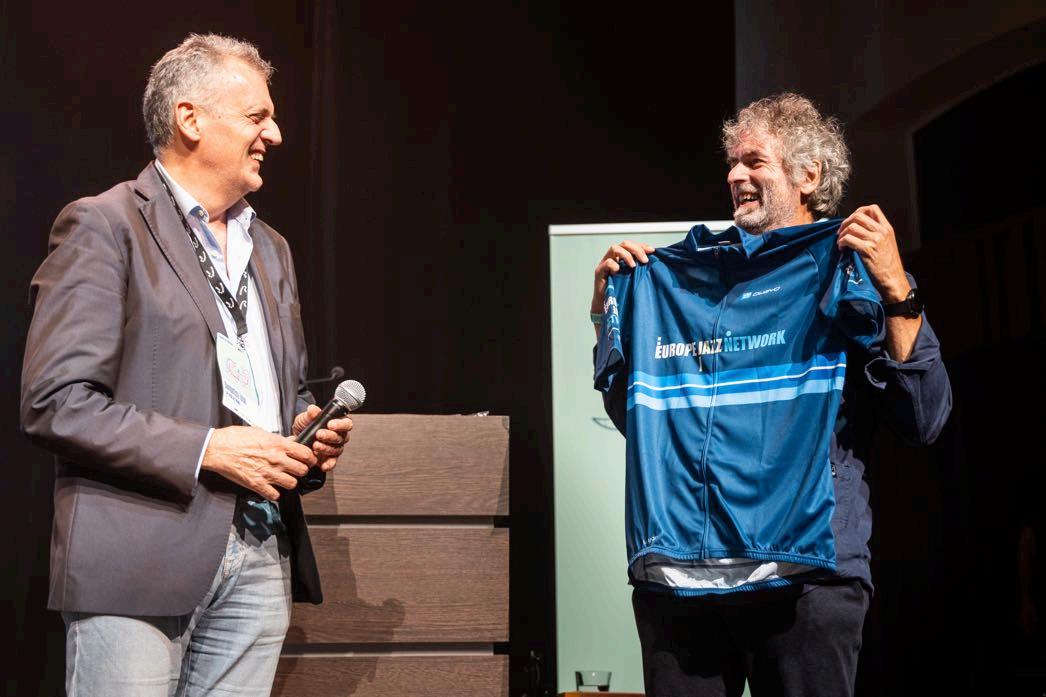
Lize thanked everyone who made the EJC 2024 possible including all the staff working at the venues. She thanked all the musicians, the speakers and the many conference partners. She noted the contribution of Giambattista, Stefano and Francesca who were presented with a gift of premium Belgium beer. Lize also thanked the conference Programme Committee, EJN Board and conference attendees for their energy. Giambattista, Francesca and Stefano in turn extended their own thanks to the entire Belgian team of the EJC, complimenting them for their incredible efforts.
Lize reminded attendees of the remaining showcase concerts, the evening’s dinner and the final day’s cultural tours.
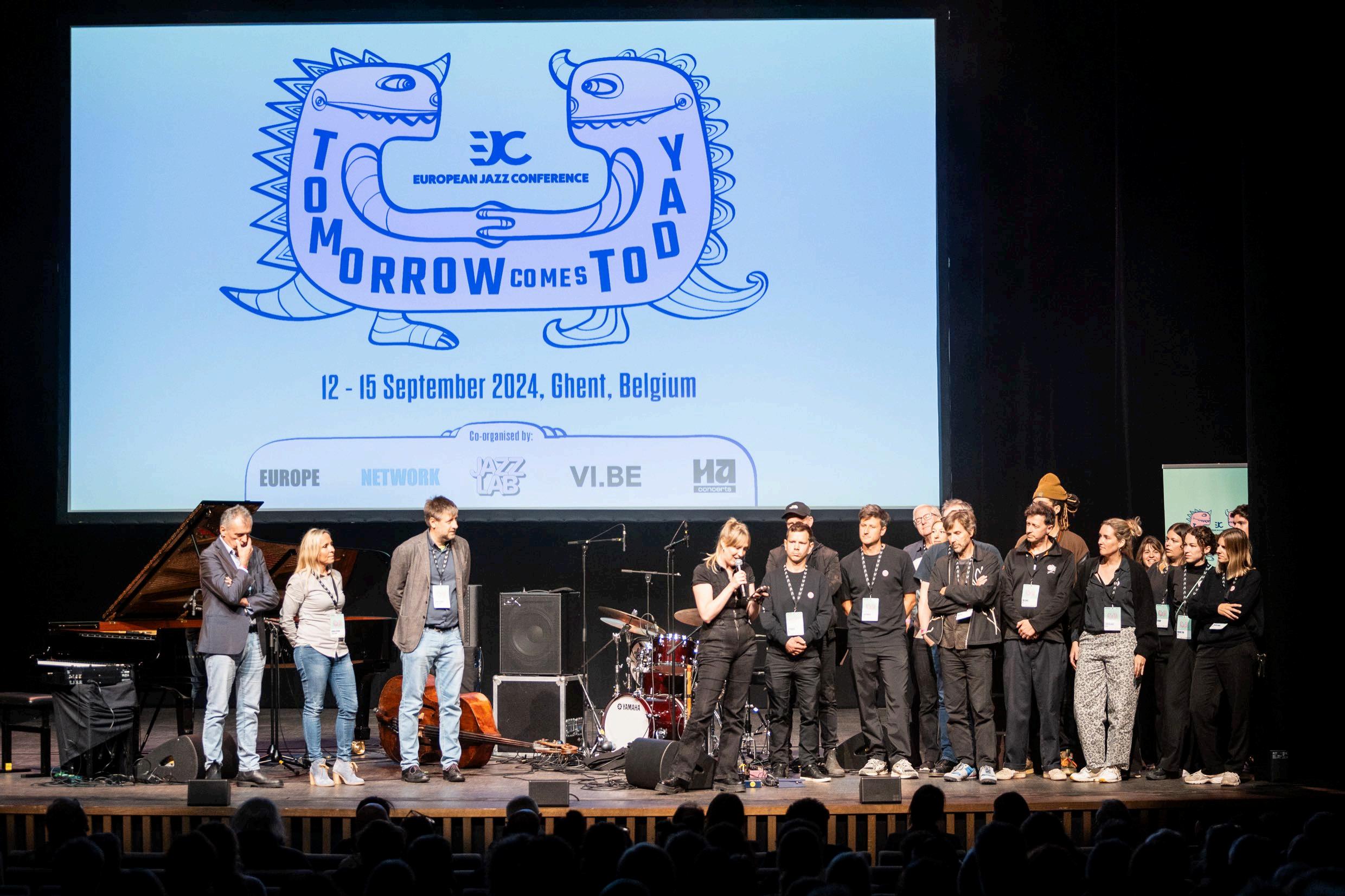
Thursday, 12 September 2024
Ha Concerts
- FOR EJN MEMBERS ONLY -
14:00 - 20:30 Registrations for EJN members - Ha Concerts lobby
15:30 - 15:45 Opening & welcome of EJN members - Main hall
15:45 - 17:30 Presentation of EJN activities & general discussion - Main hall
17:30 - 17:45 Coffee break - Foyer
18:00 - 20:30 FORMAL EJN GENERAL ASSEMBLY - Main hall
- OPEN TO ALL -
20:00 - 00:40 YOUNG CURATORS programme - De Centrale
21:00 - 21:45: Elis Floreen
22:15 - 23:00: Bodem
23:30 - 00:30: KAU
23:00 - 01:00 FRINGE concerts in five clubs around the city (two sets for each band):
23:00 - 00:40: FNUSSJEN - Club Telex
23:00 - 00:40: Camille-Alban Spreng’s ODIL feat. Nina Kortekaas - Trefpunt
23:00 - 00:40: Karen Willems - Terre Sol Four - Hot Club Gent
23:30 - 01:10: Le Monde Merveilleux de Pépito - Missy Sippy
23:30 - 01:10: Black Flower - Bar Lume
Friday, 13 September 2024
Music Centre De Bijloke
09:30 - 16:30 Registrations for everybody - De Bijloke entrance
10:30 - 11:00 Official opening & welcome speeches - Concertzaal
11:00 - 11:45 KEYNOTE SPEECH by Lisette Ma Neza (BE) - Concertzaal
Lisette Ma Neza, at 25, is a Vice-World Champion slam poet (Flup, Rio de Janeiro) and songwriter. With roots in Rwanda, she is the current city poet of the city of Brussels, writes newspaper columns, and works across theatre and music. Accompanied by pianist Neil Akenzua she will bring a poetic state of the cultural union we are a part of: Letters from a young Poetess.
12:00 - 12:30 SHOWCASE: Eve Beuvens ‘Lysis’ - Kraakhuis
12:30 - 14:00 Lunch - Foyer
14:30 - 15:00 SHOWCASE: Wajdi Riahi Trio - Concertzaal
15:15 - 17:15 Five parallel DISCUSSION GROUPS on the Conference theme:
#1 - ‘The future is green’ workshop - garden (or office in case of rain)*
This session will take the form of an interactive outdoor workshop, with a focus on well-being in a climate emergency among young musicians who are questioning pursuing their careers in the face of the climate and biodiversity crises and are concerned about their future in the music sector. How can we support them positively while working together to create a more sustainable and regenerative music industry?
* please make sure to wear comfortable outdoor clothes, if done outside
Chair: Lucy Power (Rowanbank Environmental Arts & Education, UK)
#2 - The invisible hand - Kabinet
Can AI help the work of a music programmer? Artificial intelligence-based tools are quickly becoming part of our everyday life, and it is easy to be confused or intimidated by them. There have been attempts to use some of these tools to help with festival programming, administration and project planning, resulting in increased capacity and reduced workloads. Is this something we can explore for our sector?
Chair: Andrew Lansley (Cheltenham Festivals, UK)
#3 - Nice work if you can get it - Anatomisch Theater
What are the opportunities and restrictions the young workforce see when thinking about career opportunities in our sector? How are roles changing? What are the needs and expectations of the next generation of programmers, directors, managers and leaders, and the barriers they face? We often work long and extra hours at the expense of our work-life balance: should this be acceptable?
Chair: Çağıl Özdemir (Bozcaada Jazz Festival, TR)
Nele Uyttendaele (Young Curators Programme, BE)
Clémence Creff (Kultur | lx, Luxembourg)
#4 - Curating for all - Suite
How can we ensure that our audiences include both younger and older generations? Building our audience of the future isn’t only about concerts for children and families, it’s about programming with an intergenerational approach, presenting projects that involve and appeal to both young and old. By exploring new formats and innovative ways of presenting and producing creative music, we can enrich the world of music available to children and young people.
Chair: Regina Fisch (DE/SEMBLE, AT)
Janine Irons (Tomorrow’s Warriors, UK)
Frank Wuppinger (NueJazz, DE)
Martyna van Nieuwland (Katowice JazzArt festival, PL)
#5 - Tell me a (new) story - Kraakhuis
How can we communicate jazz and creative music to a young audience? Do we need to rethink the way we tell the story? Is the poster with the saxophone still the best choice? What can we do
to communicate in a way that resonates with the younger generation? How can we find new ways to connect with them and what types of content will appeal to them?
Chair: Lena Sme (Music Observation Organisation, LV)
Agnieszka Kiepuszewska (Intl Jazz Platform, PL)
Evie Henderson (manchester jazz festival, UK)
17:30 - 18:00 SHOWCASE: Donder - Kraakhuis
18:00 - 19:00 Free time / networking
18:00 - 21:30 Late registrations - Ha Concerts
19:00 - 21:00 Dinner - Sint Pietersabdij
21:30 - 22:00 SHOWCASE: GingerBlackGinger - Ha Concerts
22:15 - 22:45 SHOWCASE: Stéphane Galland & The Rhythm Hunters - Ha Concerts
23:00 - 01:00 FRINGE concerts in five clubs around the city (two sets for each band):
23:00 - 00:30: MDCIII - Club Telex
23:00 - 00:30: Vitja Pauwels’ Early Life Forms - Trefpunt
23:00 - 00:30: Under the Reefs Orchestra - Hot Club Gent
23:30 - 01:00: NΔBOU - Missy Sippy
23:30 - 01:00: Aleph Quintet - Bar Lume
Saturday, 14 September 2024
Music Centre De Bijloke
10:00 - 13:00 Registrations for everybody - De Bijloke entrance
10:30 - 11:30 PLENARY PANEL DEBATE: Tomorrow comes Today - Concertzaal
During the debate we will hear from young people about their concerns on the future of our planet, and our music ecosystem. The looming environmental crisis is self-evident, and social and economic disparities are growing within our societies in Europe, where young people, especially from disadvantaged backgrounds, struggle to find their place. The creative music sector cannot exist in isolation, and young musicians are confronted with these challenges when thinking about their future career. The panel will bring together the perspectives of activists, youth workers and young artists to discuss possible solutions that address these challenges towards a more just, sustainable and inclusive future.
Kateryna Ziabliuk (artist, UA/PL)
Frederike Berendsen (artist & activist, NL)
Fatih De Vos (rapper, sociologist & youth worker, BE)
Moderator: Anna Umbima (writer & broadcaster, UK)
11:30 - 12:15 Celebration of EJN Awards & ZENITH AWARD 2024 concert: Liv Andrea Hauge Trio (NO) - Concertzaal
12:15 - 12:30 Group photo - Garden
12:30 - 14:00 Lunch - Foyer
14:30 - 15:00 SHOWCASE: aki - Kraakhuis
15:15 - 16:15 Wrap-up by An De bisschop (researcher & professor, BE) & presentation of the European Jazz Conference 2025 - Concertzaal
16:15 - 16:45 SHOWCASE: Orchestra Nazionale della Luna - Concertzaal
17:00 - 18:30 Free time / Networking
18:30 - 20:30 Dinner - Sint Pietersabdij
21:00 - 21:30 SHOWCASE: De Beren Gieren - Ha Concerts
21:45 - 22:15 SHOWCASE: Julien Tassin Quartet - Ha Concerts
22:30 - 01:00 SPECIAL IMMERSIVE CONCERT (+ afterparty): schntzl - Wintercircus
The Conference coincides with the opening of the new Music Club Wintercircus, featuring a brand new state-of-the-art immersive sound system, that allows every person in the circle-shaped room to experience the music in superior conditions. schntzl crafted a live show with this immersive sound, navigating the delicate balance between the raw sound of drums and hyper-digital synths and electronics. Expect to be blown away!
Sunday, 15 September 2024
10:30- 12:30Cultural tours & activities
The Conference hosts are organising three exciting cultural tours options in Ghent on Sunday. Extend your stay and immerse yourself in another full day brimming with music, culture and unforgettable moments. All tours start at 10:30 under the City Pavilion (Stadshal) and end at the same location. All tours conclude at 12:30 with a final concert under the City Pavilion by Volpe (Heleen Andriessens, Kobe Boon, Stijn Demuynck), supported by 123 Piano. Please check out the next pages for all details!
First name Family Name Organisation
Country
Martel Ollerenshaw Australian Music Centre Australia
Christoph Huber Jazz & Musicclub Porgy&Bess Austria
Gabriele Mazic Ruolo Porgy & Bess Austria
Daniela Neumayer Jazzfestival Saalfelden Austria
Valentin Schuster Bezau Beatz Austria
Mario Steidl Jazzfestival Saalfelden Austria
Jean-Pierre BISSOT Gaume Jazz, asbl Belgium
Benny Claeysier KAAP Belgium
Wouter Degraeve VI.BE Belgium
Hélène Déom Gaume Jazz, asbl Belgium
Julien Fournier WBM Belgium
Liliana Graziani Wallonie-Bruelles Musiques Belgium
Luc Nowé VI.BE Belgium
Pablo Smet Muziekmozaïek Belgium
Jair Tchong HaConcerts Belgium
Danny Theuwis LEUVEN JAZZ FEST / 30CC Belgium
mik torfs JazzLab Belgium
Bart Vanvoorden kunstencentrum nona Belgium
Filip Verneert Muziekmozaïek Belgium
Wim Wabbes HaConcerts Belgium
Edin Zubcevic Jazz Fest Sarajevo Bosnia and Herzegovina
Yordanka Bekirska AtoZ Foundation Bulgaria
Peter Dimitrov AtoZ Foundation Bulgaria
DAMJAN GRBAC G.I.S. d.o.o. Croatia
Veronika Friedlova Mladí ladí jazz Czech Republic
Petr Maceček JAZZFESTBRNO AHEAD, s.r.o. Czech Republic
First name Family Name Organisation Country
Eliska Pirkova Nerudny fest.cz Czech Republic
Vilém Spilka JAZZFESTBRNO AHEAD, s.r.o. Czech Republic
Anders Boye Knudsen Jazz9tus Denmark
Eva Frost JazzDanmark Denmark
Lars Thor Jensen JazzDanmark Denmark
Camilla Juul JazzDanmark Denmark
Anne Erm Jazzkaar Festivals Estonia
Kirke Karja Eesti Jazzliit MTÜ Estonia
Birgit Krullo Jazzkaar Festivals Estonia
Elo-Liis Parmas Jazz Estonia / Eesti Jazzliit Estonia
Kaisa Potisepp Jazzkaare Soprade Uhing Estonia
Jaak Sooäär Jazz Estonia / Eesti Jazzliit Estonia
Hans Peter Klintrup Finnish Jazz Federation Finland
Minnakaisa Kuivalainen Tampere Music Festivals Finland
Matti Lappalainen Espoo Big Band ry Finland
Sakari Puhakka Helsinki Jazz ry Finland
Annamaija Saarela G Livelab Tampere Finland
Maria Silvennoinen Finnish Jazz Federation Finland
Pekka Tähkävuori Rajatsi ry Finland
Ségolène ALEX jazzebre France
Florian Allender JAZZ(s)RA France
Maryline BAILLY
Office de Tourisme et des Congrès d'Antibes Juan-les-Pins France
Nader Beizaei BANLIEUES BLEUES France
Antoine Bos AJC France
Mame BOUSSO Le Petit faucheux France
Antoine DE LA RONCIERE Le Petit faucheux France
Pierre Dugelay Periscope France
Sylvain ELIE Le Petit faucheux France
Régis GUERBOIS
FESTIVAL MARSEILLE JAZZ DES CINQ CONTINENTS France
Laura Hanequand Grands Formats France
Alexandre Herer Grands Formats France
First name Family Name Organisation Country
Hughes KIEFFER
FESTIVAL MARSEILLE JAZZ DES CINQ CONTINENTS France
Lizon Lavaud Centre national de la musique (CNM) France
Xavier Lemettre director France
Tiphanie Moreau Jazz sous les pommiers France
Steve Nuissier Guadeloupe France
Marie Persuy AJC France
Anouk Petitot AJC France
Frédéric Roy Pannonica France
Mathilde Sallez Le Périscope France
Erwan Vernay Grands Formats France
Katharina Ahrendt
Förderkreis Jazz und Malerei München e.V. / Jazzclub Unterfahrt Germany
Thomas Baerens Participant Germany
Michael Braun Enjoy Jazz gGmbH Germany
Malgorzata Cnota
Pierre Boulez Saal, Barenboim-Said Akademie gGmbH Germany
Nadin Deventer Jazzfest Berlin/Berliner Festspiele Germany
Jakob Fraisse jazzahead! Trade Fair & Festival Germany
Gottfried Held Germany Germany
Tuuli Kaeramaa WOMEX / Piranha Arts Germany
Sybille Kornitschky jazzahead! / MESSE BREMEN Germany
Sabrina Lahoud Monheimer Musikfestival GmbH Germany
Ina Lieckfeldt ELBJAZZ GmbH Germany
Reiner Michalke Monheimer Musikfestival GmbH Germany
Ella-
Simone O'Brien-Coker Initiative Kölner Jazz Haus e.V. / NICA artist development Germany
Gregor Polzin Stadtgarden Cologne Germany
Cora Schultze
Karsten Jahnke Konzertdirektion GmbH Germany
Michael Stückl Förderkreis Jazz und Malerei München e.V. / Jazzclub Unterfahrt Germany
Kornelia Vossebein Initiative Kölner Jazz Haus e.V. Germany
Esther Weickel Initiative Kölner Jazz Haus e.V. Germany
Frank Wuppinger NUEJAZZ Festival Germany
Leonidas Antonopoulos
Athens Jazz Festival, Kosmos Radio, KosmosJazz Radio
Greece
Antonis Zouganelis Athens Jazz Greece
Tamás Bognár Opus Jazz Club / BMC Records Hungary
Edit Jancsó Opus Jazz Club / BMC Records Hungary
Ágnes Máthé Opus Jazz Club / BMC Records Hungary
Rebekka Blöndal Reykjavik Jazz Festival Iceland
Sunna Gunnlaugsdotti r solfinna ehf Iceland
Scott McLemore Solfinna Iceland
Gauti Stefansson Reykjavik Jazz Festival Iceland
Mick Bonner Moving On Music Ireland
Itamar Bernstein Synthesizer Israel
Barak Weiss Barak Weiss / Israel Jazz Society Israel
Omri Yagen IMSF - Israel Music Showcase Festival Israel
Silvia Alunni Visioninmusica Italy
Corrado Beldi I-Jazz Italy
Enrico Bettinello NovaraJazz Italy
Paolo Caiani Ponderosa music & art Italy
Aniello Caruso Associazione Empoli Jazz Italy
Roberto Catucci Fondazione Musica per Roma Italy MADDALE
NA CIOCCA Puglia Sounds - TPP Italy
Federico D'Anneo Jazz Italian Platform Italy
Filippo d'Urzo Associazione Empoli Jazz Italy
Enzo Favata Jana Project Italy
Chiara Gozzi
Associazione Culturale Rest-Art Italy
Luciano Linzi Fondazione Musica per Roma Italy
Francesco Mariotti Pisa Jazz Italy
Francesco Martinelli Eventi SCRL Italy
Elena Migliorati Jazz Network - Jazz Italian Platform Italy
mario mormone NEUMA SRL Italy
michele mozzicato Neuma srl Italy
Giovanni Oreno Associazione Empoli Jazz Italy
Christian Russano Associazione Culturale Rest-Art Italy
Claudia Sergio
Roberto Tubaro
Puglia Sounds - Consorzio Teatro Pubblico Pugliese Italy
Jazz Music Promotion Südtirol-Alto
Adige Italy
ANGELO VALORI PESCARA JAZZ Italy
Max von Pretz
Jazz Music Promotion Südtirol-Alto
Adige Italy
Stefano Zenni Torino Jazz Festival Italy
Aleksandra Line Latvian Music Information Centre Latvia
Santa Sillere Latvian Music Information Centre Latvia
Inga Vamze Latvian Music Information Centre Latvia
Dorotėja Būdaitė Lithuanian Jazz Union Lithuania
Dmitrij Golovanov Lithuanian Jazz Union Lithuania
Clémence Creff Kultur | lx - Arts Council Luxembourg Luxembourg
Per Hasse Andersen Maijazz - Stavanger International Jazzfestival Norway
Jan Bang Punkt Norway
Stian Eismann MIDTNORSK JAZZSENTER Norway
Miloud Guiderk Cosmopolite Scene Norway
Kai Gustavsen Bærum Kulturhus Norway
Roy Jahrn Holtan Norsk jazzforum Norway
Audun Humberset Vestnorsk jazzsenter Norway
Kari Grete Jacobsen East Norway Jazz Centre Norway
Line Juul Oslo Jazzfestival Norway
Eirik Kristensen Cosmopolite Scene Norway
Helleik Kvinnesland Stavanger jazzforum Norway
Øyvind Larsen Nasjonal jazzscene - Victoria Norway
Magnus Lunay
MOLDE INTERNATIONAL JAZZ FESTIVAL Norway
Roger Lygre Solvang Bergen Jazzforum Norway
Ragnhild Menes Kongsberg Jazzfestival Norway
Mari Marie Nyvoll Mandaljazz Norway First name Family Name Organisation Country
Jan Ole Otnæs Honorary Member Norway
Sigrun Tara Øverland Sørnorsk jazzsenter Norway
Ernst Sandbakk Trondheim Jazzfestival Norway
Arild Schei Dokkhuset Scene A/S Norway
Jon Skjerdal Nattjazz Norway
Arvid Wam Solvang Bærum Kulturhus Norway
Tom Svendsgård Nattjazz Norway
Nina Torske
STIFTELSEN VESTNORSK
JAZZSENTER Norway
Roger Urhaug Vossa Jazz Norway
Endre Volden
MOLDE INTERNATIONAL JAZZ FESTIVAL Norway
ULLASTINA WILAND Nordnorsk Jazzsenter Norway
Bjørn Willadsen MIDTNORSK JAZZSENTER Norway
Malwina Witkowska MIDTNORSK JAZZSENTER Norway
Magdalena FIJALKOWSKA Fundacja Jazz nad Odra Poland
Thomasz Handzlik Jazz Juniors Festival & Competition Poland
Karolina Juzwa Wytwornia Foundation Poland
Agnieszka Kiepuszewska Wytwórnia Fundation Poland
Piotr Turkiewicz
Jazztopad Festival / National Forum of Music Poland
Martyna van Nieuwland Katowice City of Gardens Poland
Katarzyna Werner Wytwórnia Foundation Poland
Carlos Martins Associação Sons da Lusofonia Portugal
Fernando Sousa Fundação Casa da Música Portugal
Oliver Belopeta Skopje Jaz Festival North Macedonia
Dzijan Emin
Macedonian Association of Jazz
Musicians and Free Artists North Macedonia
Kostadin Shurbanovski Skopje Jazz Festival North Macedonia
Macedonian Association of Jazz
Goce Stevkovski
Sebastian Gheorghiu UCIMR Romania First name Family Name Organisation Country
Musicians and Free Artists North Macedonia
Manuela Clapon UCIMR Romania
Ciprian Moga Jazzmine.World Romania
Teodor Pop Fapte Romania
Vojislav Pantić Belgrade Jazz Festival Serbia
Bogdan Benigar Druga Godba Slovenia
Stanislava Blatnik Jazz Ravne Slovenia
Robert Jamnik Jazz Ravne Slovenia
Simon Kenda Zavod Jazz Cerkno Slovenia
GERARD ARGEMI SORIANO Ultramar club Spain
Angela Blanco Ruiz Plataforma Jazz España - Sedajazz Spain
Javier Estrella Ruiz Plataforma Jazz España Spain
Marina Fernández Garcia Agullo Plataforma Jazz España Spain
ROSA GALBANY JAZZ I AM / Taller de Músics Spain
Miguel Ramírez Colorado Producciones SL Spain
Axel Almström Fasching Sweden
Sara Asplund AB Fasching Musikproduktion Sweden
Eric Birath AB Fasching Musikproduktion Sweden
Love Ekberg GAC - Göteborg Artist Center Sweden
Loredana Franza Semente ekonomisk förening Sweden
Jacob Hallberg Örebro Jazz & Beyond Sweden
Gustav Karlsson Frosty Umeå Folkets Hus Sweden
Hans Jonas Knutsson Jonas Knutsson Musikproduktion AB Sweden
Gavin Maycroft AB Fasching Musikproduktion Sweden
Louise Nordgren Svensk Jazz Sweden
Chinaski Nymark Producer Sweden
Maria Rylander Knutpunkt c/o Göteborg Artist Center Sweden
Fred Warnby Örebro Jazz & Beyond Sweden
Jean-Yves Cavin Cully Jazz Festival Switzerland
Yunus Durrer Jazz Verein Moods Switzerland
Urs Röllin Schaffhauser Jazzfestival Switzerland
Raluca Baicu North Sea Round Town The Netherlands
Liesbeth Beeftink LantarenVenster The Netherlands First name Family Name Organisation Country
First name Family Name Organisation Country
Sophie Blussé Stichting Music Meeting
Rana Bulut Music Meeting
Vera de Lange TivoliVredenburg
The Netherlands
The Netherlands
The Netherlands
Michelle Kuypers MOJO Concerts / North Sea Jazz The Netherlands
Mijke Loeven BIMHUIS
The Netherlands
Marieke Meischke Jazz Maastricht The Netherlands
Marzio Scholten RAUW / Jazz International Rotterdam The Netherlands
Tami Toledo Matuoka Bimhuis
Frank van Berkel BIMHUIS
Isla van Hout BIMHUIS
Guy van Hulst TivoliVredenburg
The Netherlands
The Netherlands
The Netherlands
The Netherlands
Huub Van Riel Huub van Riel The Netherlands
Mark van Schaick inJazz / Buma Cultuur
The Netherlands
Michelle Wilderom North Sea Round Town The Netherlands
Hatice Arici Zorlu Performing Arts Center Turkey
Harun Izer Istanbul Foundation For Culture & Arts Turkey
Cagil Ozdemir 3dots
Murat Sezgi 3dots
Turkey
Turkey ŞÜKRAN
GÖZDE SİVİŞOĞLU
AKBANK JAZZ FESTIVAL / AKBANK ART CENTER
seren toptan Nilufer Municipality
Günsu Yesilyaprak Istanbul Jazz Festival
Mariana Bondarenko Ukrainian Institute
Anastasiya Vaganova Ukrainian Institute
Fiona Alexander Edinburgh Jazz & Blues Festival
Kevin Appleby Turner Sims Southampton
Alexandria Carr Cheltenham
Ruth Fisher Jazz FM
Evie Henderson Manchester Jazz Festival
Janine Irons Tomorrow's Warriors
Nod Knowles NKP
Andrew Lansley Cheltenham Festivals
Turkey
Turkey
Turkey
Ukraine
Ukraine
United Kingdom
United Kingdom
United Kingdom
United Kingdom
United Kingdom
United Kingdom
United Kingdom
United Kingdom
First name Family Name Organisation Country
Graham McKenzie
Huddersfield Contemporary Music Festival (hcmf//) United Kingdom
Steve Mead Manchester Jazz Festival United Kingdom
Gerard Mehigan Edinburgh Jazz & Blues Festival United Kingdom
Katy Minter B:Music United Kingdom
Pelin Opcin Serious Events / EFG London Jazz Festival United Kingdom
Paul Pace Ronnie Scott’s Jazz Club United Kingdom
Patricia Pascal Tomorrow's Warriors United Kingdom
Ros Rigby Honorary EJN Member United Kingdom
Orphy Robinson Musician United Kingdom
JILL RODGER Glasgow International Jazz Festival United Kingdom
Lucy Scott The Glasshouse International Centre for Music United Kingdom
Nigel Slee Jazz North United Kingdom
Heather Spencer Jazz North United Kingdom
Helena Summerfield Jazz North United Kingdom
Sarah Weller Palmglen Ltd. trading as Ronnie Scott's Jazz Club United Kingdom
First name Family Name Organisation Country
Regina Fisch DE/SEMBLE Festival, TUMULTTOTAL Austria
Brigitte Fessmann JazzBFango -artist agenncy Austria
Csenge Hamod SAUDADES TOURNEEN Austria
Jakob Flarer SAUDADES TOURNEEN GMBH Austria
Lobke Aelbrecht #catch Belgium
Joachim Badenhost aki Belgium
Willem Heylen aki Belgium
Marjolein Vernimmen aki Belgium
Anke Verslype aki Belgium
Kurt Overbergh Ancienne Belgique (AB) Belgium
Maaike Wuyts Aubergine Artist Management Belgium
Maaike Wuyts Aubergine Artist Management Belgium
Paméla Malempré Aubergine Management Belgium
Lieve Boussauw Brosella Belgium
Jolan Huygens Brussels Jazz Alert Belgium
Thadeus Jolie Brussels Jazz Orchestra vzw Belgium
Betty Vanlangendonc k Brussels Jazz Orchestra vzw Belgium
Camille-
Alban Spreng Camille-Alban Spreng Belgium
Nicolas Michaux Capitane Records Belgium
Nora Helali chouette asbl Belgium
Christine Peterges christine peterges - arts management Belgium
danielle dierckx De Roma vzw Belgium
Toon Van Deuren De Roma vzw Belgium
Peter De Backer De Standaard Belgium
Aike Roodenburg Engagement Arts Belgium
Eve Beuvens Eve Beuvens 'Lysis' Belgium
Akin Fatih De Vos Fatih De Vos Belgium
Louis Kubben FAZZ - Museact Belgium
Zoé Dufour FAZZ (Museact) Belgium
maarten van rousselt Flagey Belgium
Anniek Vanhee Flat Earth Society Belgium
Jeroen Bossee Freelance Belgium
Bram Lootens Freelance Belgium
An De bisschop Ghent University Belgium
Ilja Bracke Greenhouse Talent NV Belgium
Evelien De Jaeger HaConcerts Belgium
Jasper Persoons HaConcerts Belgium
MICHEL MAST Ham Sessions vzw Belgium
Pierre Vielleret Igloo Records Belgium
Pierre Vielleret Igloo Records Belgium
Stefanie Ghettem Inside Jazz Belgium
Stefanie Ghettem Inside Jazz Belgium First name Family Name Organisation Country
Wouter Spillebeen Inside Jazz Belgium
Wouter Spillebeen Inside Jazz Belgium
Jens Tytgat Inside Jazz Belgium
Dominique Renard Jazz in Belgium website Belgium
Georges Tonla Briquet Jazz'halo (+ freelance other websites & magazines) Belgium
Asante Brochez JazzLab Belgium
Elina Kuokkanen JazzLab Belgium
Guy Peters JazzLab Belgium
Yves Tassin Jazzmania Belgium
Jacques Prouvost Jazzques / Jazzmania Belgium
Thomas Melhan JazzXploration Belgium
Joshua Dellaert Joshua Dellaert Belgium
Lies Steppe Klara Belgium
Ilse Thienpont kunstencentrum nona Belgium
Lynn Dewitte LD Music Agency Belgium
Oscar Georges Le Monde Merveilleux de Pépito Belgium
Pierre-
Antoine Savoyat Le Monde Merveilleux de Pépito Belgium
Els Parein Muziekcentrum De Bijloke Belgium
Geert Riem Muziekcentrum de Bijloke Belgium
Tuur Verschoren Muziekcentrum De Bijloke Belgium
Kristof Roseeuw Muziekcentrum De Bijloke / Musician Belgium
Nabou Claerhout N∆BOU Belgium
Wouter Bongaerts PlayRight Belgium
Cathy Lorge PlayRight Belgium
Christian Martin PlayRight Belgium
Vincent Goris Radio Klara Belgium
Julie Mosar Radio Klara Belgium
Nico Bogaerts Radio Panik Belgium
Femke Vanpoucke Rataplan Belgium
Sam Donné Rockoco Belgium
Griet De Blende Rumoer! Belgium
Margaux Daerden Sabam
Mikis Duprez Sabam
Belgium
Belgium
Olivier Maeterlinck Sabam Belgium
Frederik Meeuwis Sabam Belgium
Inneke Plasschaert Sabam Belgium
Stef Bossuyt Stad Gent Belgium
Marijke Leye Stad Gent Belgium
Sami Souguir Stad Gent Belgium
Albane Van Gheluwe Stad Gent Belgium
Clement Nourry Under The Reefs Orchestra Belgium
Jeroen Ackerman VI.BE Belgium
Silke Bergans VI.BE Belgium
Dries Bluekens VI.BE Belgium
Korneel Boon VI.BE Belgium
Lize Colson VI.BE Belgium
Lucas Declercq VI.BE Belgium
Michelle Frison VI.BE Belgium
Didier Goossens VI.BE Belgium
Emma Joos VI.BE Belgium
Stijn Lemaire VI.BE Belgium
Charlotte Lootens VI.BE Belgium
Art Philippeth VI.BE Belgium
Lisa Snyders VI.BE Belgium
Laurens Vansteelandt VI.BE Belgium
Roel Vergauwen VI.BE Belgium
Kaat Verhelst VI.BE Belgium
Joris Preckler VRT Belgium
Pierre Hurty Wajdi Riahi Trio Belgium
Basile Rahola Wajdi Riahi Trio Belgium
Wajdi Riahi
Wajdi Riahi Trio / Aleph Quintet / Stéphane Galland & The Rhythm Hunters Belgium
Henri Vandenberghe You, YourSelf & Rie Belgium
Kobe Gregoir Young Curators
Kobe Gregoir Young Curators
Belgium
Belgium
Nele Uyttendaele Young Curators Belgium
Warre Vanhoutte Young Curators Belgium
Warre Vanhoutte Young Curators Belgium
Lisette Ma Neza Belgium
Alain Bédard Effendi Canada
Judith Humenick Judith Humenick Productions Canada
Yves Léveillé Les Productions Yves Léveillé Canada
Mingo Rajandi Mingomango Estonia
Virgo Sillamaa V Sillamaa Consulting OÜ Estonia
Minna Huuskonen Minnamurra Music Management & Agency Finland
Alexandre Todorovic ANTEPRIMA France
Mario Borroni Citizen Jazz France
Francesca Cerretani EJN Europe Jazz Network France Giambattist
a Tofoni EJN Europe Jazz Network France
Cyril Chaplault Les Productions du Mouflon France
Maite Dhelin LMD Productions France
François Matarasso None France
Laurent Carrier Orotone France
Nathalie Bonneveau Orotone/Koa France
Julie Cottier
Stéphane Scharlé
OZMA / La Compagnie Tangram / Propulsion France
OZMA / La Compagnie Tangram / Propulsion France
Adrien Pigeat Second Brain France
Manon Le Hir Your European Stage France
Louis Rastig A L'Arme! Germany
Charlotte Jestaedt Attaché+++ Germany
Cornelia Herbold Bremme-Hohensee Germany
Julia Kastl Delicious Tunes Germany
Waldo Riedl domicil gGmbH Germany
First name Family Name Organisation Country
Ibrahim Bilen F-Cat Productions GmbH Germany
Simon Alter HANDSHAKE BOOKING Germany
Maxime Libiszewski JAW Family Germany
thomas vermynck JAW Family Germany
Catarina Pauli Caldas Kulturprojekte Berlin Germany
Marita Goga Marita Goga music arts conception Germany
Tinka Steinhoff Tinka Steinhoff Booking Germany
Jutta Unger unger music - Booking & Productions Germany
David Maier Worms: Jazz and Joy Germany
Zsolt Hernádi BMC - Budapest Music Center Hungary
Ábel Petneki BMC - Budapest Music Center Hungary
Stefano Zucchiatti Europe Jazz Network Italy
Jelena Smelova Skaņu mežs Latvia
Pascal Dorban Radio ARA Luxembourg
Stephanie Baustert SBMM Luxembourg
Brahim El Mazned Visa For Music Morocco
Fredrik
Luhr Dietrichson Liv Andrea Hauge Trio Norway
August Glännestrand Liv Andrea Hauge Trio Norway
Liv Andrea Hauge Liv Andrea Hauge Trio Norway
DUDU SARR DAKAR MUSIC EXPO Senegal
Pedro Martinez Maestre New Trad Records Spain
Marina Roveta Vela Producciones Submarinas Spain
Ebba Westerberg Coompanion/Bunkern Bokar Sweden
Neil Akenzua Lisette Ma Neza Sweden
Sanda Torima SANTORI management Switzerland
Sophie Schouten Bass clarinet NL The Netherlands
Robert van der Padt Bird Call Bookings The Netherlands
Tijn Wybenga Brainteaser Orchestra The Netherlands
Frederike Berendsen Frederike Berendsen The Netherlands
Julian Bohn
Music Declares Emergency NL The Netherlands
Tobias Klein T.S. KLEIN The Netherlands
First name Family Name Organisation Country
Kateryna Ziabliuk Meloport Ukraine
Graeme Rigby Accompanying Ros Rigby
Ian Patterson All About Jazz
Anna Umbima Freelance
United Kingdom
United Kingdom
United Kingdom
Lee Paterson GO Between United Kingdom
Kevin Legendre Jazzwise United Kingdom
Joseph Paice Music Works International United Kingdom
lucy power
Rowanbank Environmental Arts & Education CIC United Kingdom
Eric Addeo AMI USA
Peter Margasak Downbeat USA
Izabela Olejniczak Ina Dittke & Associates USA
Luigi Sidero Music Works International USA
AFTER-MOVIE of the European Jazz Conference 2024:
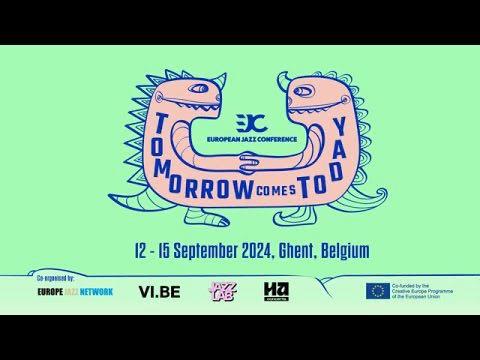
MEDIA CLIPS:
All About Jazz-Intl, by Ian Patterson (conference): “European Jazz Conference 2024” - LINK
All About Jazz-Intl, by Ian Patterson (showcases): “Belgian Jazz Showcase - European Jazz Conference 2024” - LINK
Downbeat-USA, by Peter Margasak: “Tomorrow comes Today at Europe Jazz Network gathering” - LINK
Jazzwise-UK, by Kevin Le Gendre “Tomorrow comes Today, European Jazz Conference 2024 Ghent, Belgium” - LINK
Jazz Journal-UK, by Pascal Dobran: “European Jazz Conference no.10, Ghent” - LINK
Jazz North-UK: “Educations highlights from the European Jazz Conference 2024” - LINK
Citizen Jazz-FR, by Mario Borroni: “European Jazz Conference: “Le futur se fit à Gand” - LINK
Jazz’Halo-BE, by Georges Tonla Briquet: “European Jazz Conference 2024” - LINK
VRT2-BE, by Ward Schouppe: “Beste Belgische jazzbands spelen 4 dagen lang in Gentse cafés” - LINK
Luminous Dash-BE: “Gent wordt enkele dagen een Jazz-Walhalla” - LINK1 - LINK2 - LINK3
Musiczine.net-BE: “European Jazz Conference 2023” - LINK1 - LINK2 - LINK3
BR Klasik-AT (38’40”): “ARD Jazz. Das Magazin” of 25 September - LINK
Klasika-LV: “Ivars Arutjunjans Rīgā, LMIC - "Europe Jazz Network" ģenerālasamblejā Gentē”LINK
BCB radio-UK: “The Big Beat Show” of 8 October - LINK
Programme Committee 2024
Wim Wabbes (Ha Concerts, BE), Silke Bergans (VI.BE, BE), Mik Torfs (JazzLab, BE), Alex Carr (Cheltenham Jazz Festival, UK), Rosa Galbany (Taller de Músics / Jazz I AM, ES), Karolina Juzwa (Intl Jazz Platform / Wytwórnia Foundation, PL), Steve Mead (Manchester Jazz Festival, UK), Max von Pretz (Südtirol Jazz Festival, IT)
Europe Jazz Network
Giambattista Tofoni, General Manager
Francesca Cerretani, Event & Office Manager
Stefano Zucchiatti, Communication & Content Manager
Hosts
VI.BE
Ha Concerts
JazzLab
Showcase & Fringe locations
Trefpunt
Club Telex
Hot Club Gent
Bar Lume
De Centrale
Missy Sippy
Music Centre De Bijloke
Wintercircus
Showcase & Fringe selection
Raluca Baicu (North Sea Round Town, NL)
Matti Nives (We Jazz, FI)
Pierre Dugelay (Le Périscope, FR)
Tiphanie Moreau (Jazz Sous Les Pommiers, FR)
Guy Peters (Nona Arts Centre, BE)
Irene Rossi (AB, BE)
George Tonla Briquet (journalist, BE)
Video & photographers
Bjorn Comhaire
Laurens Wille
Justine Wolfs
Geert Vandepoele
Jeroen Bossee
Sjoerd Tanghe
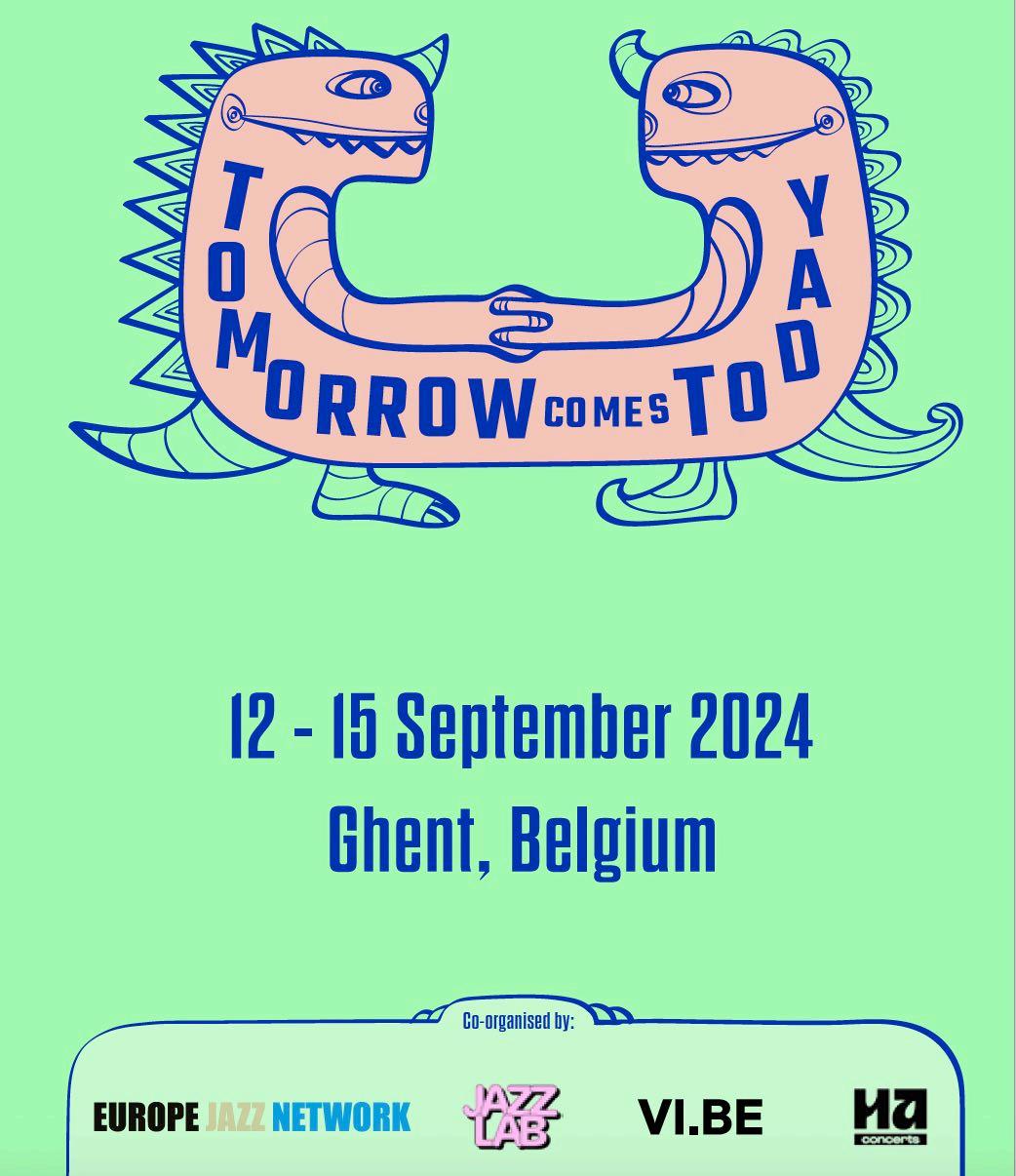
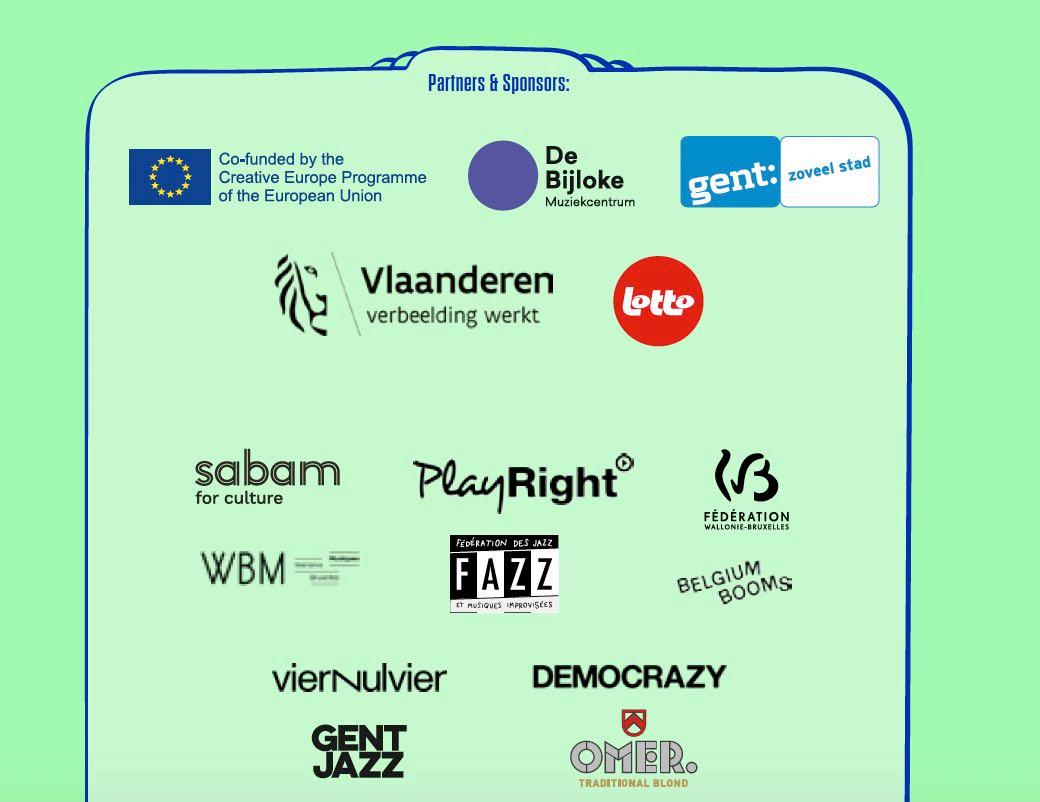
Thanks to all our volunteers, the musicians, the speakers and everyone who made this project possible! Also a special thanks to Lotto, Stad Gent, Vlaamse Gemeenschap and Creative Europe for their support!
This publication reflects the views only of the authors, and the European Commission cannot be held responsible for any use which may be made of the information contained therein
